Special Report
The Surprising Stories Behind 50 Country Names
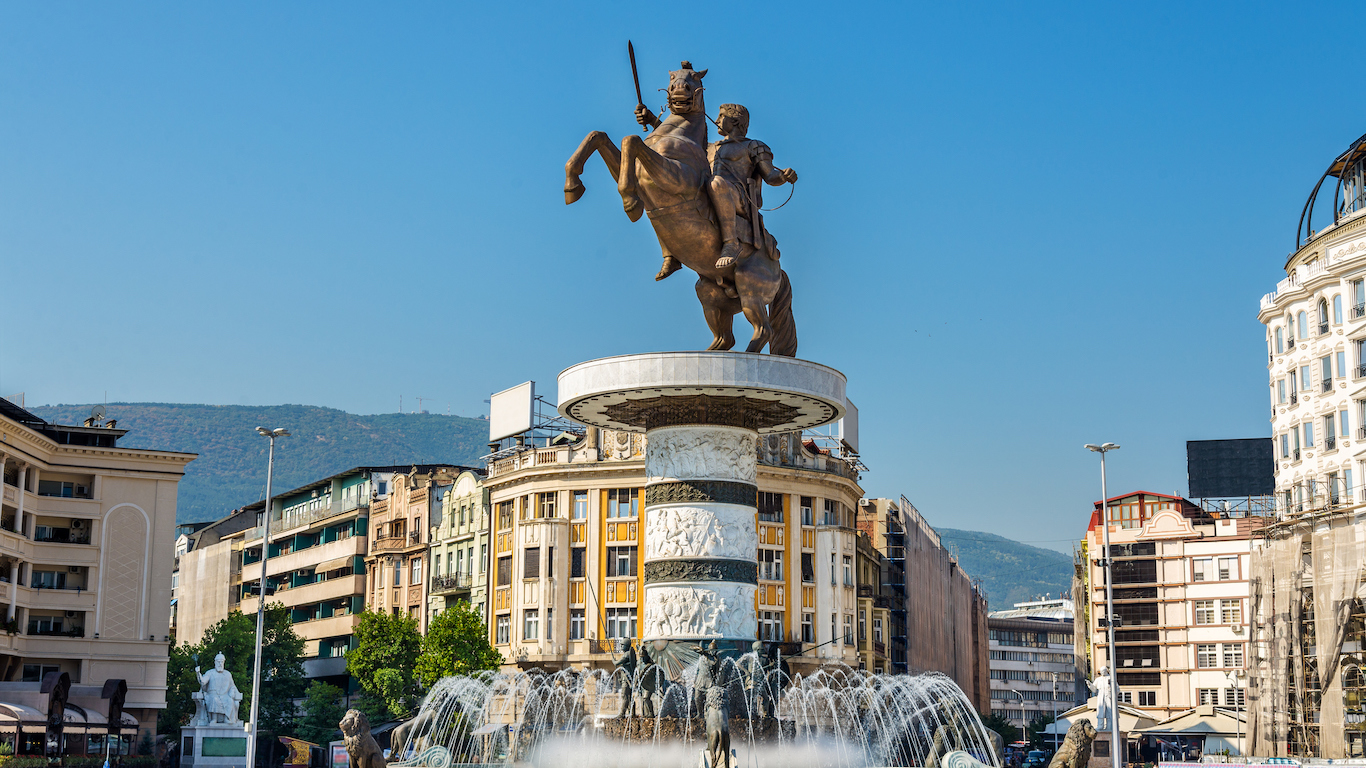
Published:
Last Updated:

Part of the joy of travel is discovering the background and the story of the country you are visiting. Names of nations can tell you something about a country’s history, geography, legends, and who is living there.
24/7 Wall St. reviewed sources such as Globehunters to compile a list of the surprising stories behind 50 country names.
Click here to read about the surprising stories behind 50 country names
Countries tend to be named after: a geographic feature, the ethnicity of its residents, the characteristics of its inhabitants, someone important, a spiritual inspiration, or the legacy of explorers.
The names of many of the countries in Central America reference water, such as Honduras (“Deep water”). European nations such as the Slovak Republic (“Land of the Slovaci”) and Finland (“Land of the Finns”) are often named after the ethnic group that lives there.
Some countries take their moniker from the physical characteristics of their natives, such as Macedonia (“Land of the tall people”). It should come as no surprise that Bolivia’s name is derived from South American revolutionary leader Simon Bolivar (“Bolivar’s land”).
Countries in the Caribbean such as St. Kitts & Nevis are named after Christian saints (“St. Christopher”). Many of the nations have made tourism a major part of their economy. Here are the most tourist-friendly countries in the world.
We know the story of how America was named — after famed Italian navigator Amerigo Vespucci. But did you know Vespucci had a hand in the name of another country in the Western Hemisphere?
All the world’s nations have a story to tell about how they were named. Here are the surprising stories behind 50 country names.
24/7 Wall St. reviewed sources such as globehunters.com, etymonline.com, and everyculture.com to compile a list of the surprising stories behind 50 country names.
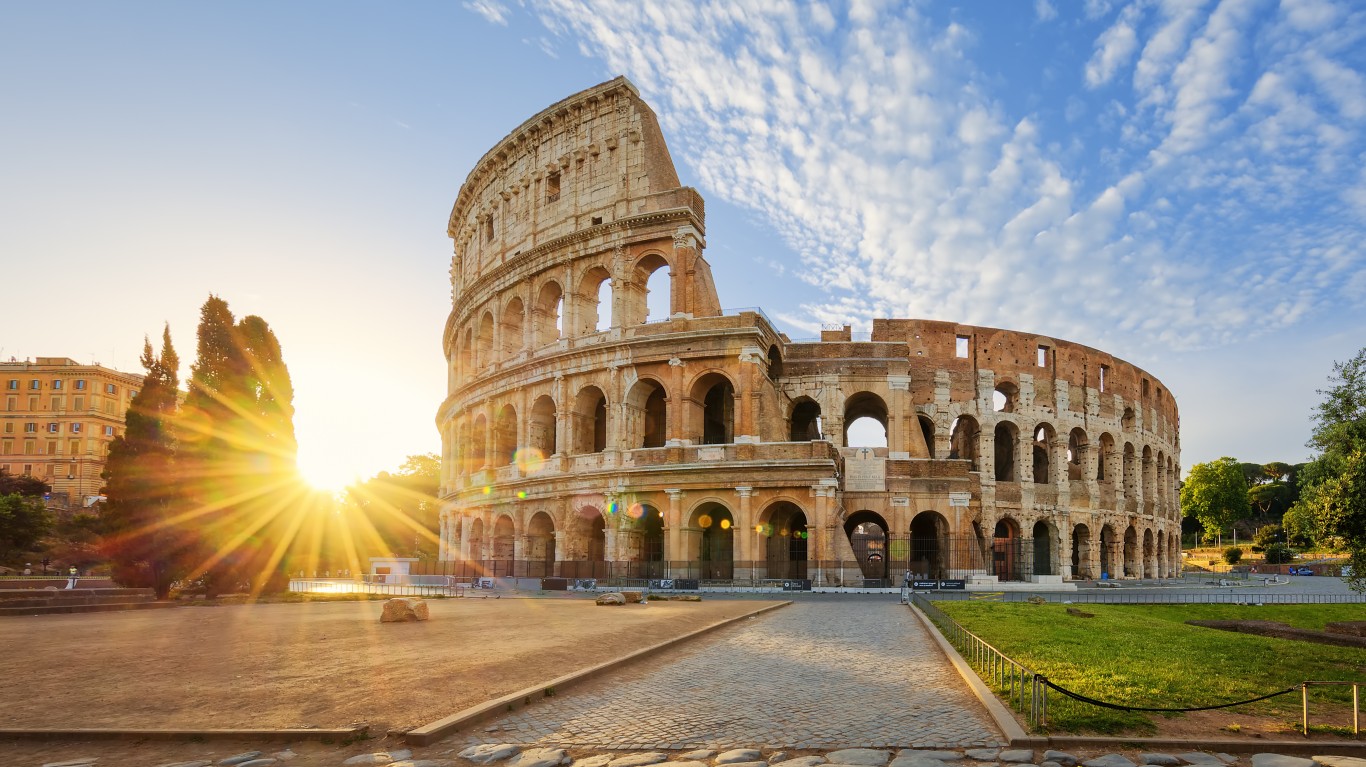
1. Italy
> Population: 60.4 million
The name Italy might have come from Vitali, the name of a tribe that settled in the region of Calabria. That part of Italy is connected with the Latin word “vitulus” or “calf.” This is where “land of cattle” might have come from. Another theory is the name refers to the legendary ruler Italus.
[in-text-ad]
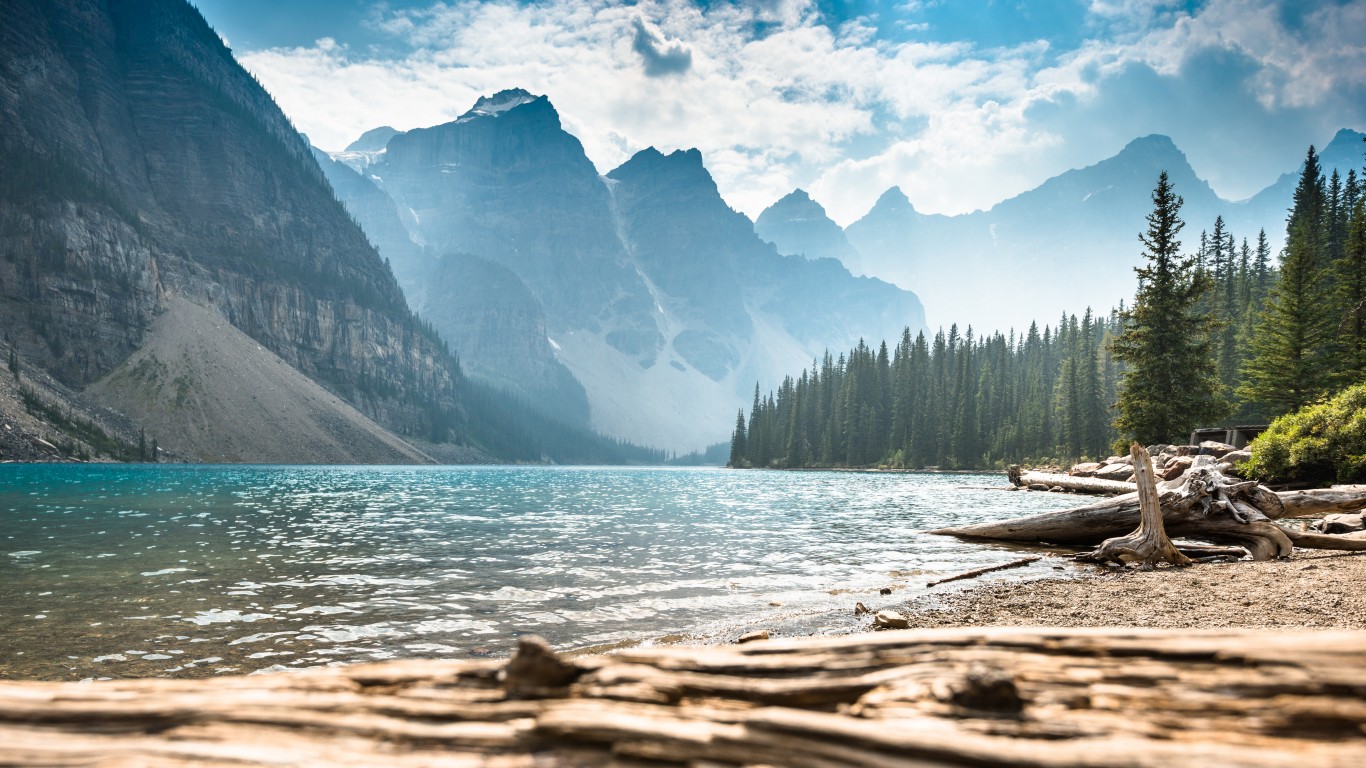
2. Canada
> Population: 37.1 million
The name Canada originated in the 1560s and is believed to be a derivation of a word from an Iroquoian language spoken in the St. Lawrence Valley.

3. Mexico
> Population: 126.2 million
The origin of the name “Mexico” likely came from the Mayan Nahuatl language meaning “place of the Mexica,” nomads who migrated to the Valley of Mexico.
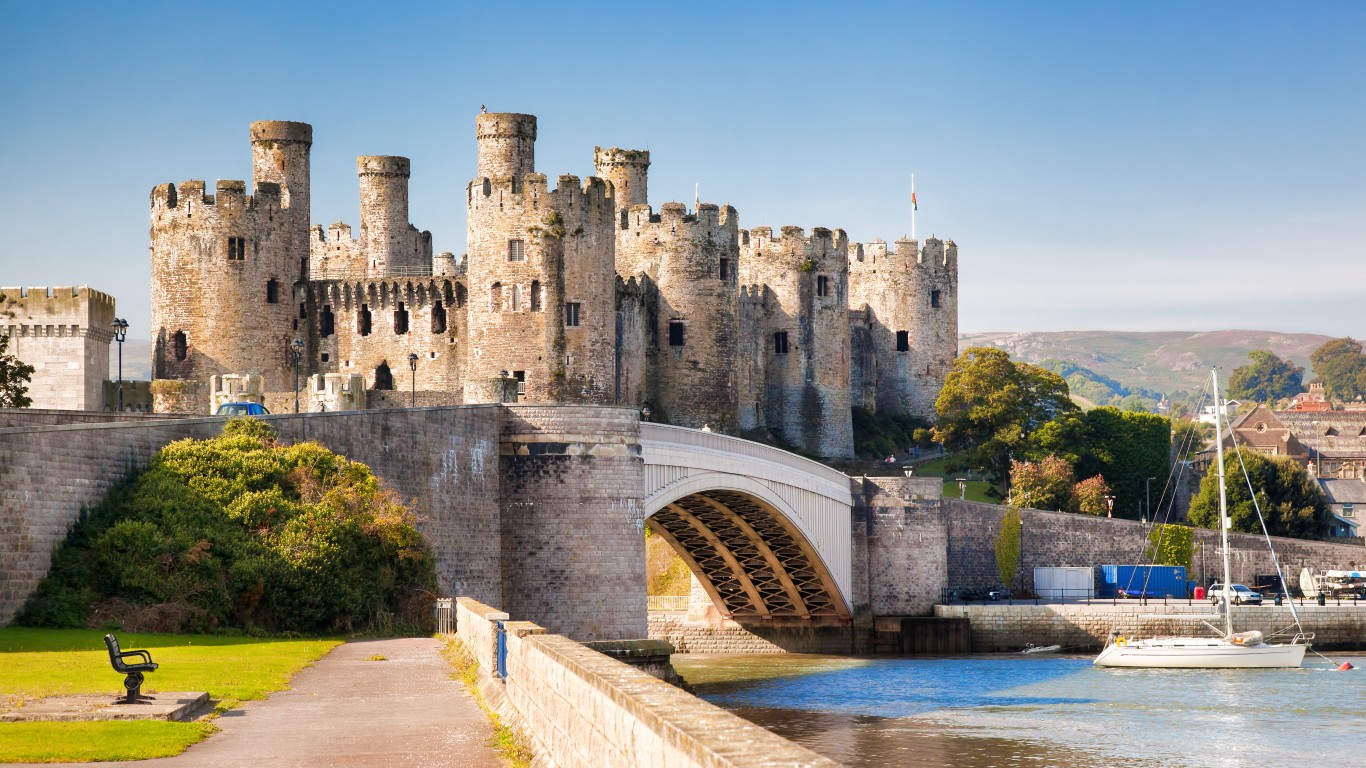
4. Wales
> Population: 3.1 million
“Cymru” is the Welsh word for Wales and it means “‘friends” or “fellow countrymen.” However, most people know the nation as Wales, which stems from a word used by the Anglo Saxons who invaded the region, and it means “foreigners” or “outsiders.”‘
[in-text-ad-2]

5. Kosovo
> Population: 1.8 million
The name Kosovo comes from a Serbian place name that means “field of blackbirds.”
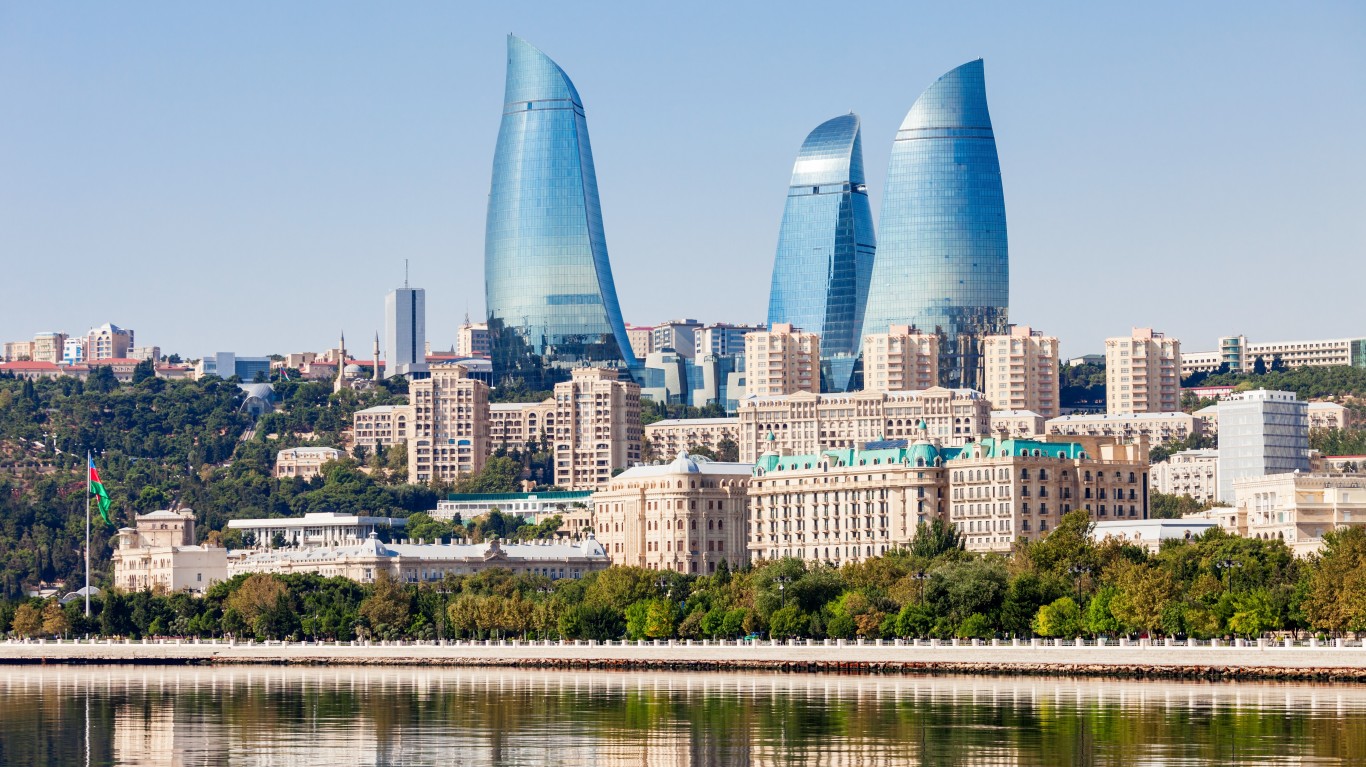
6. Azerbaijan
> Population: 9.9 million
Azerbaijan has massive amounts of oil and natural gas, and when gas escapes to the surface it can ignite. The nation’s name comes from the ancient Persian name Aturpatakan, which translates to “A place where the sacred fire is preserved.”
[in-text-ad]
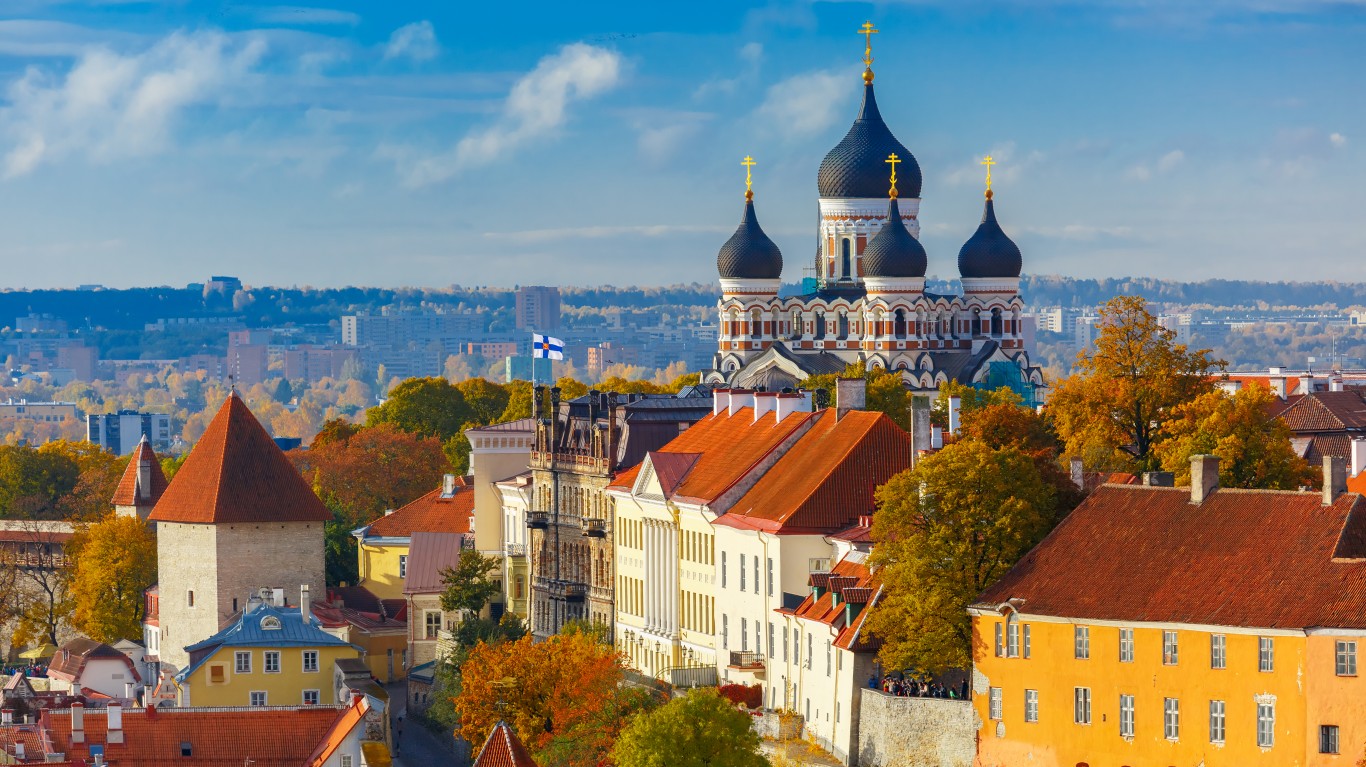
7. Estonia
> Population: 1.3 million
Estonia’s name is said to be derived from a German word for east. Another theory is that the name comes from a native name meaning “waterside dwellers.”
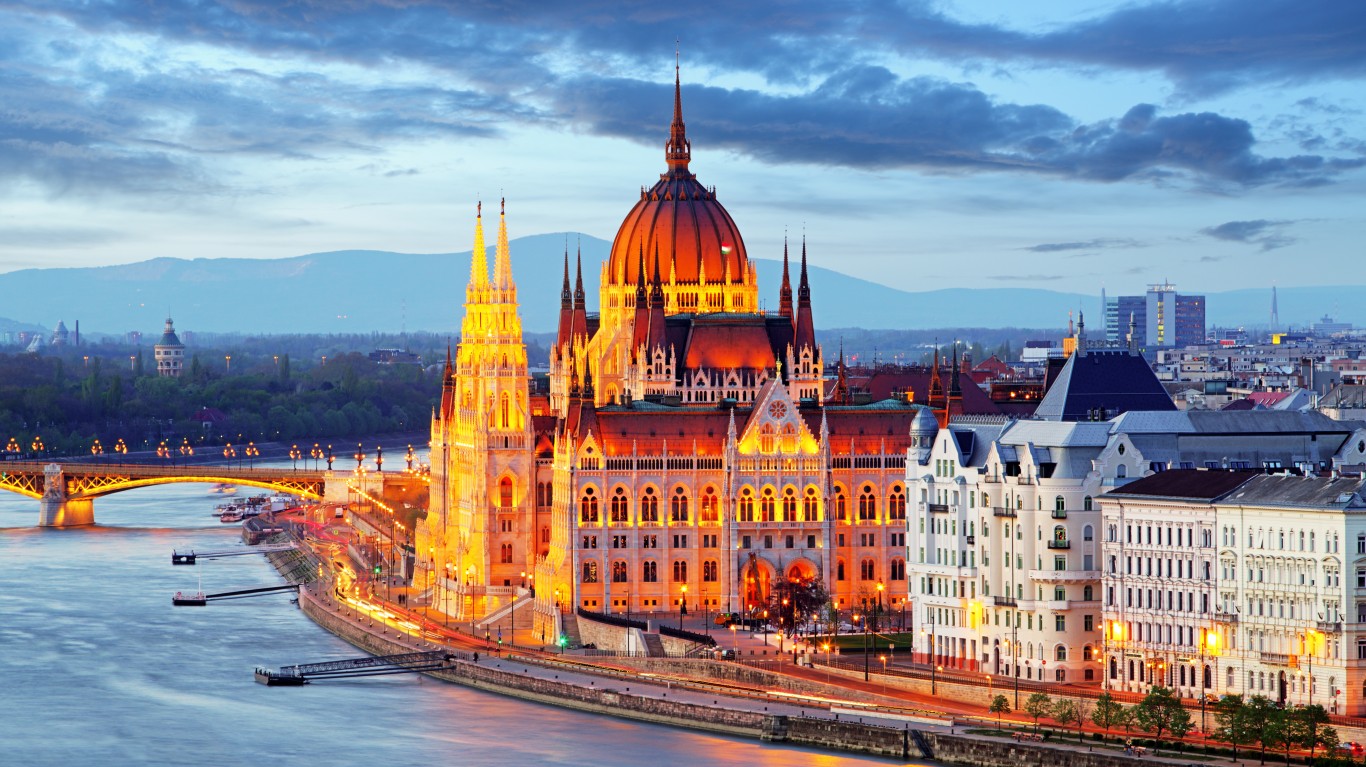
8. Hungary
> Population: 9.8 million
There are two theories on how Hungary was named. One is that it was called “10 Arrows” after the name of the tribes who migrated there in the ninth century. The other theory is that it comes from the Medieval Latin word “Hungaria,” which likely means “land of the Huns,” after Attila the Hun conquered much of Europe in the fifth century.
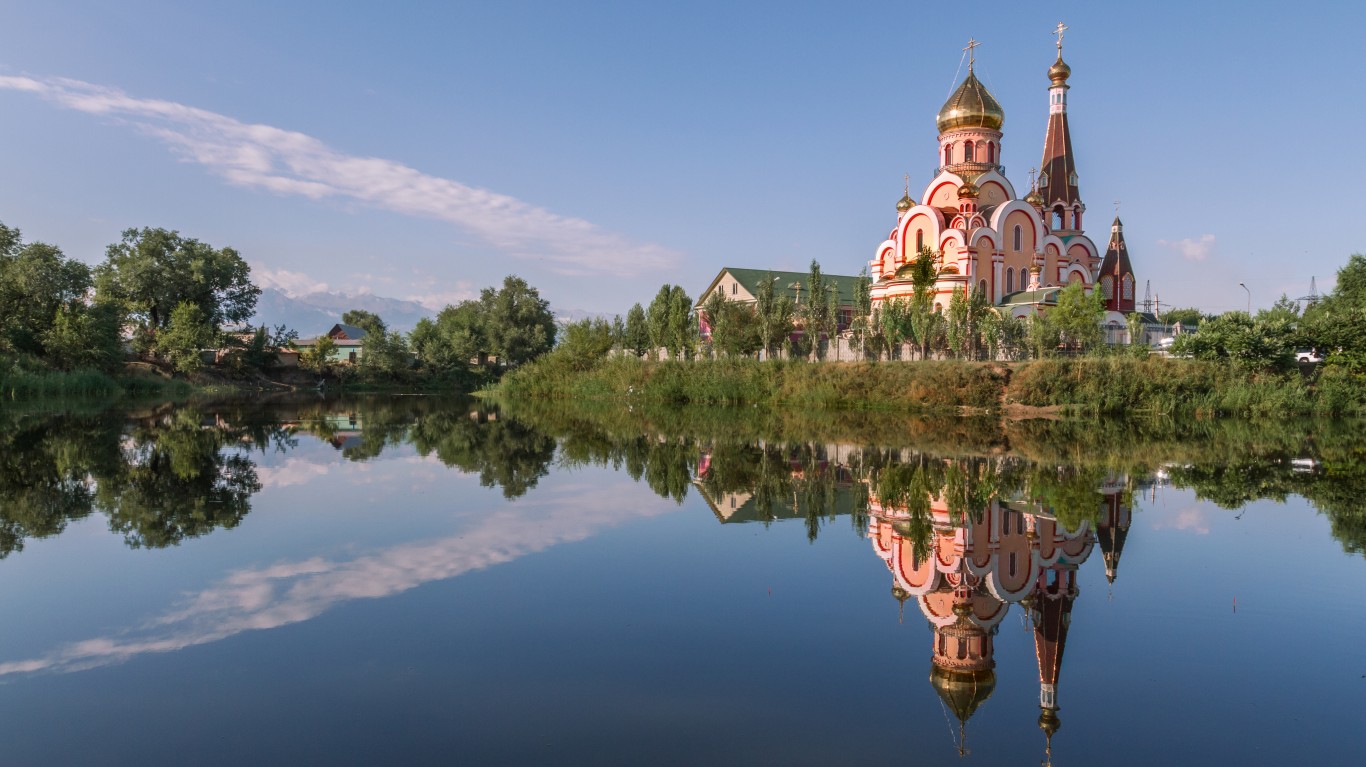
9. Kazakhstan
> Population: 18.3 million
Kazakhstan’s name is derived from the Turkish word for “horsemen” or the “riders of the steppes.” Fully translated, the name means “land of the horsemen”
[in-text-ad-2]
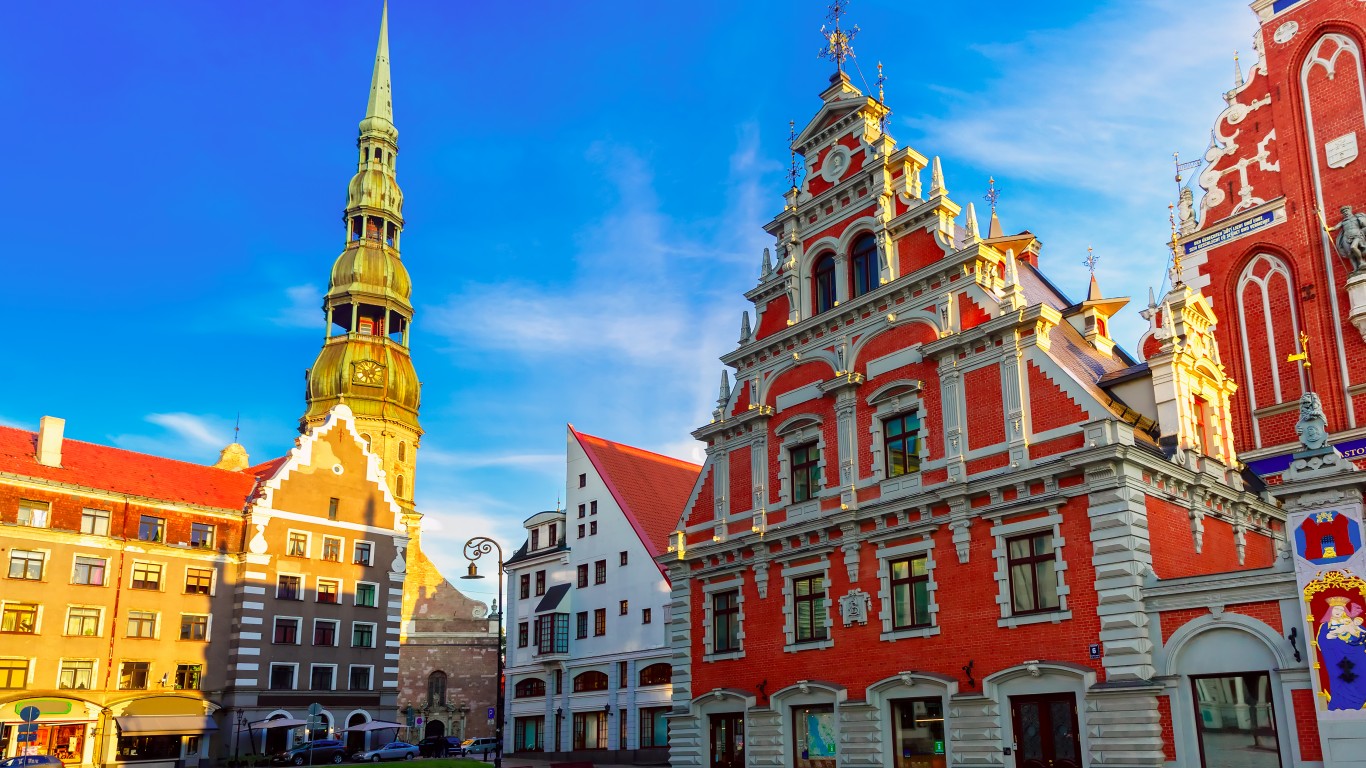
10. Latvia
> Population: 1.9 million
The name Latvia comes from the word “latvis,” meaning “forest clearer.” .

11. Liechtenstein
> Population: 38,000
Liechtenstein means “bright stone.” The nation is named after the Liechtenstein family who came from Austria.
[in-text-ad]
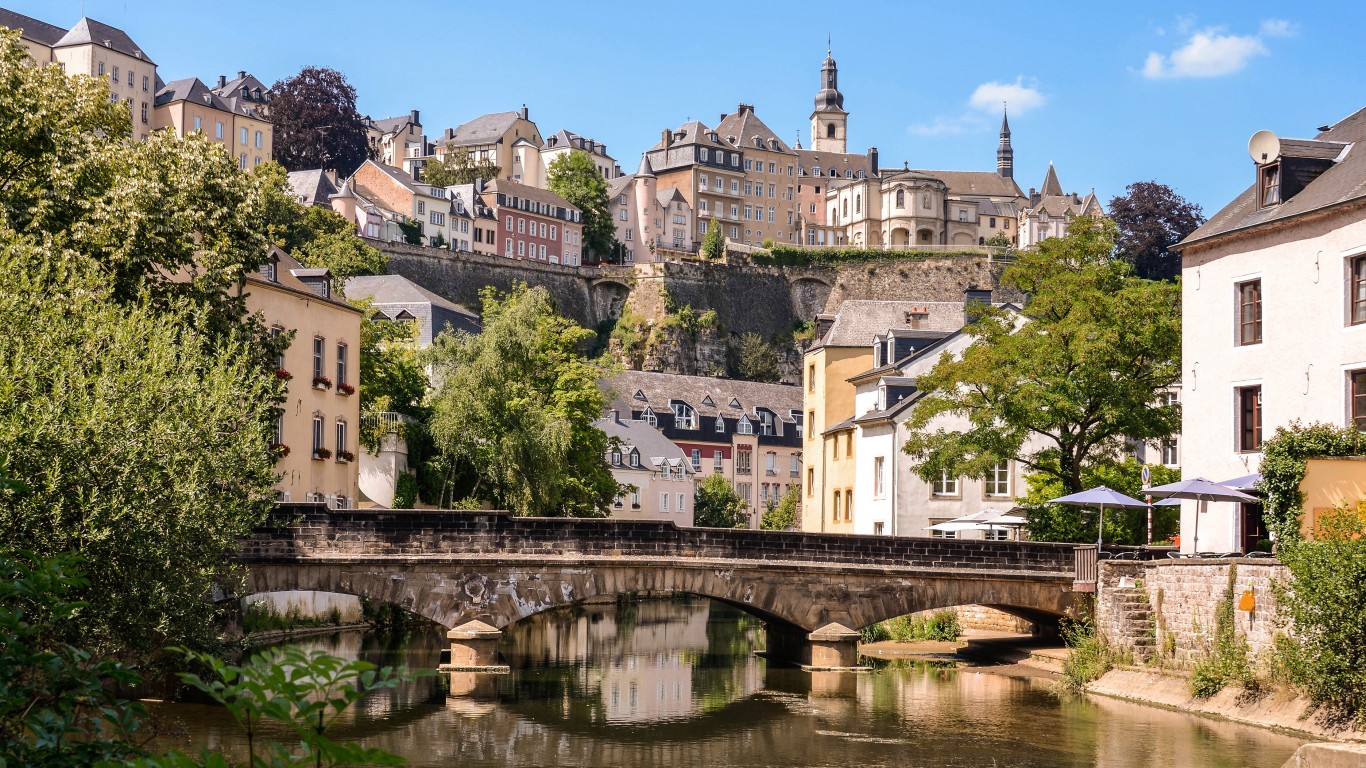
12. Luxembourg
> Population: 607,000
Luxembourg’s name is derived from the Germanic “lutilla” (little) and “burg” (fort, castle).
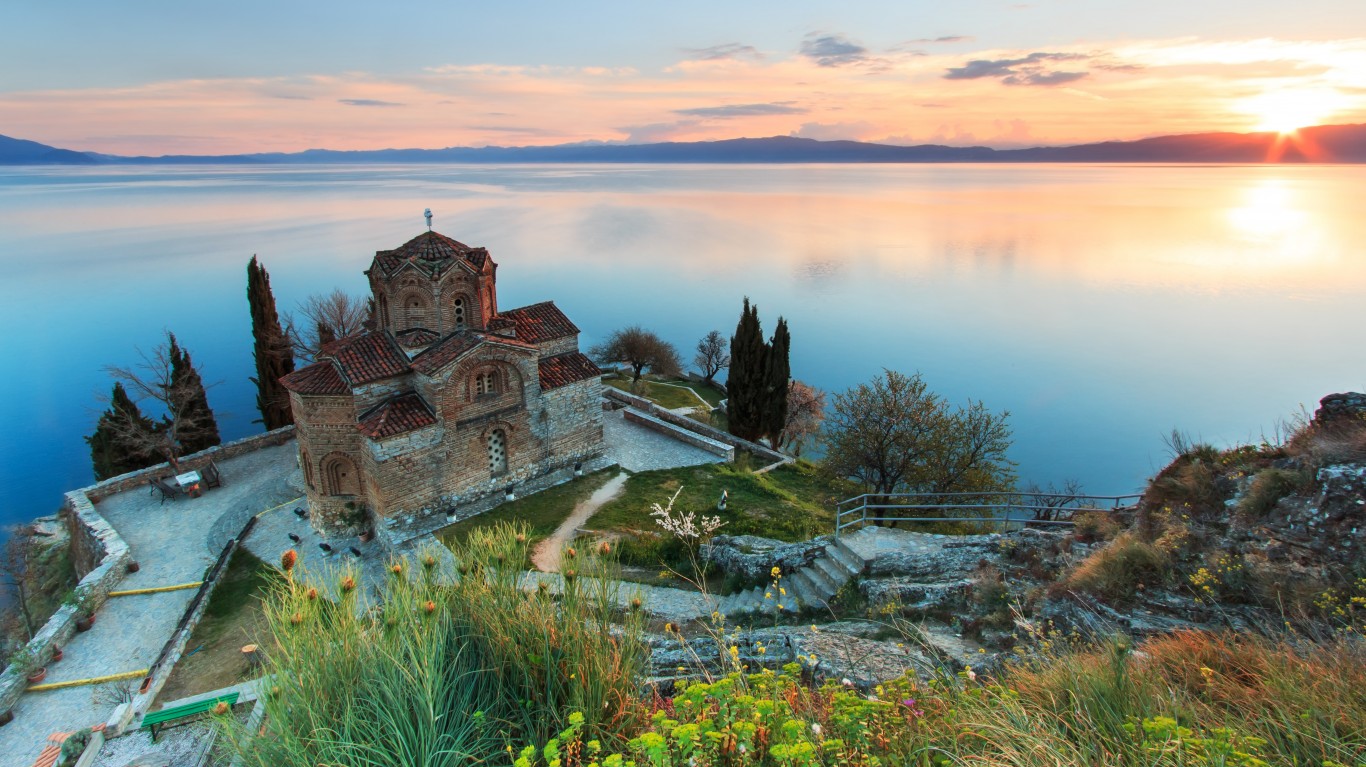
13. Macedonia
> Population: 2.1 million
Macedonia comes from the Greek word “makedones,” and it means “highlanders” or “the tall ones.”
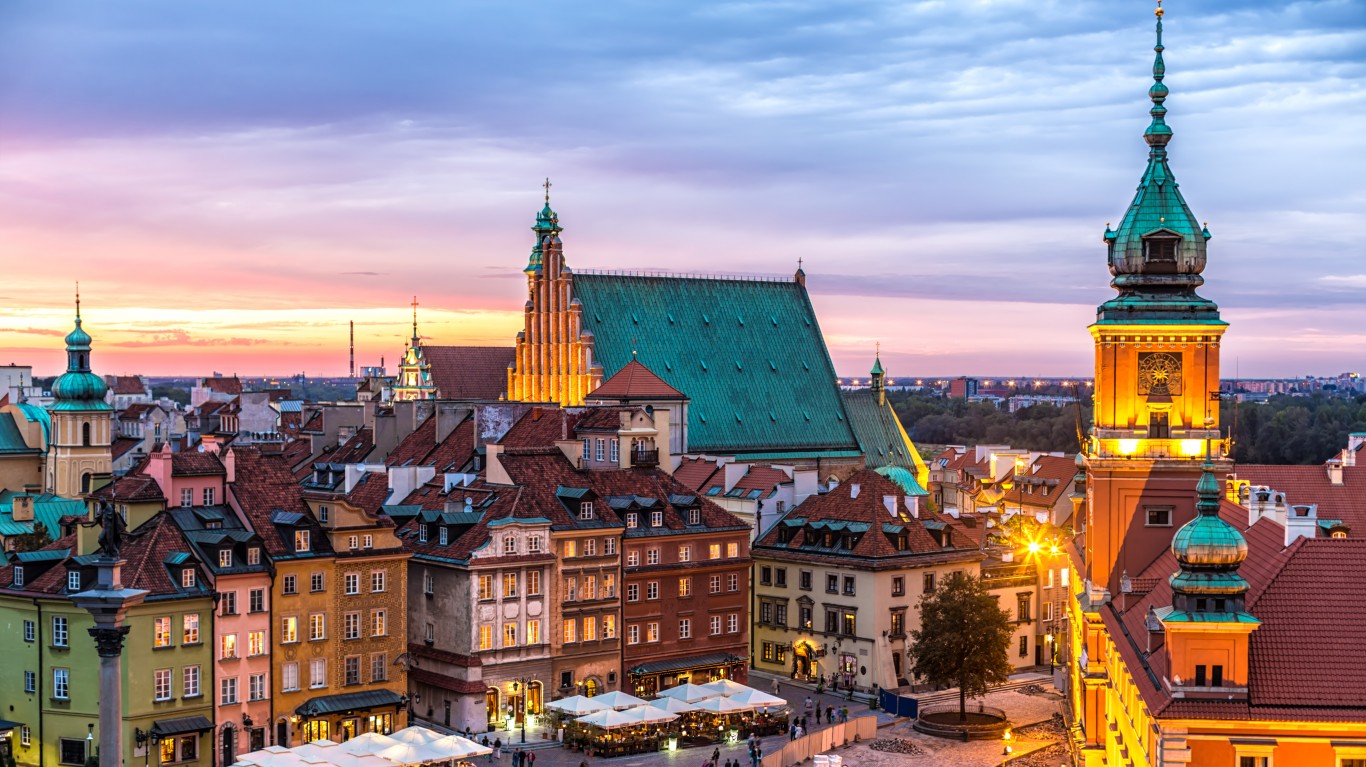
14. Poland
> Population: 37.9 million
Poland’s name comes from a Slavonic tribe near what is now the city of Poznan. It means “people of the field, meadow, or plain.”
[in-text-ad-2]
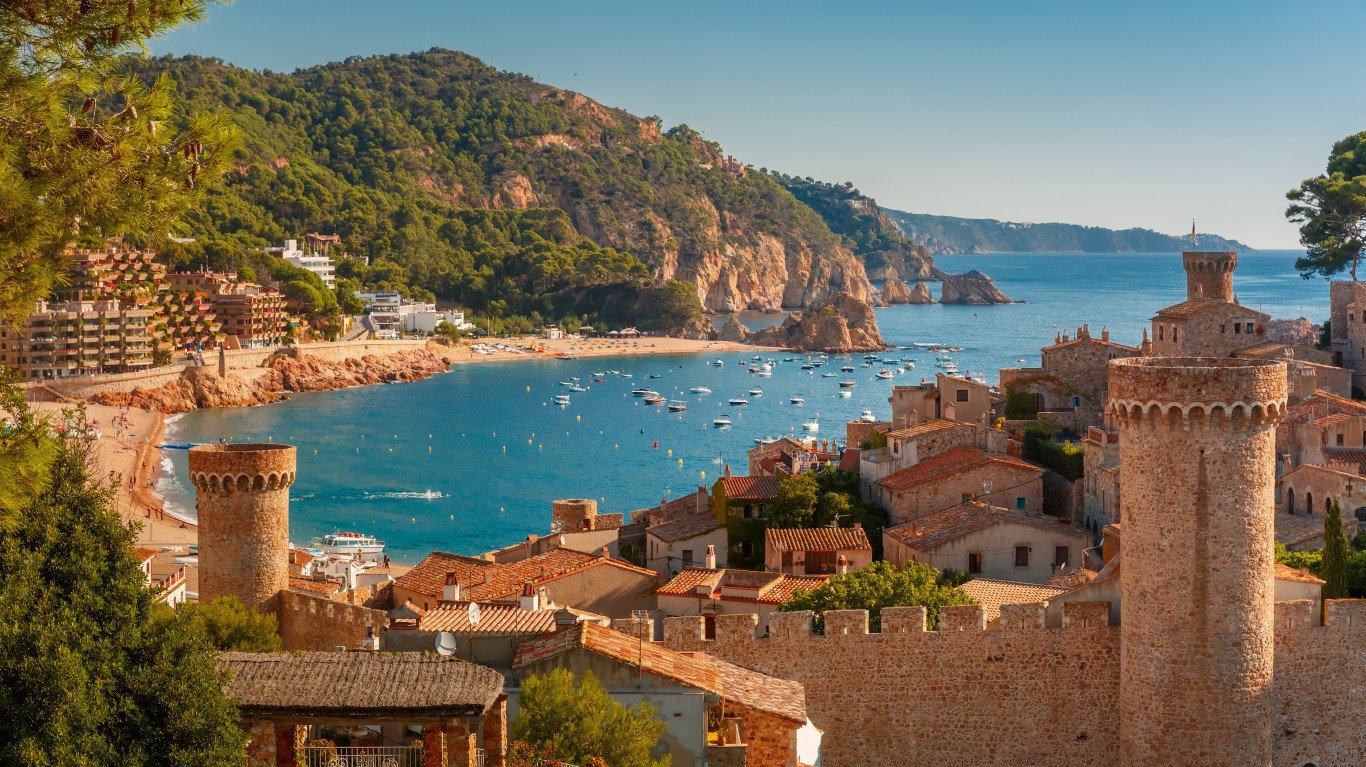
15. Spain
> Population: 46.7 million
The word “span” or “tsepan” was the Punic word for rabbit, and apparently there were a lot of them in ancient times. It’s possible it comes from the word “spahn” or “North,” as the nation is north of Carthage. The Romans later Latinized the name to Hispania, which became the Spanish Espanya, which was anglicized to Spain.

16. Ukraine
> Population: 44.6 million
Ukraine’s name is derived from the Russian word “okraina” or “(land) on the edge” or “borderland.” The name also has lexical derivation from the word “kraj” (country) and “krayaty,” meaning to demarcate a border. This designated the territory between Russia and Poland and Lithuania.
[in-text-ad]
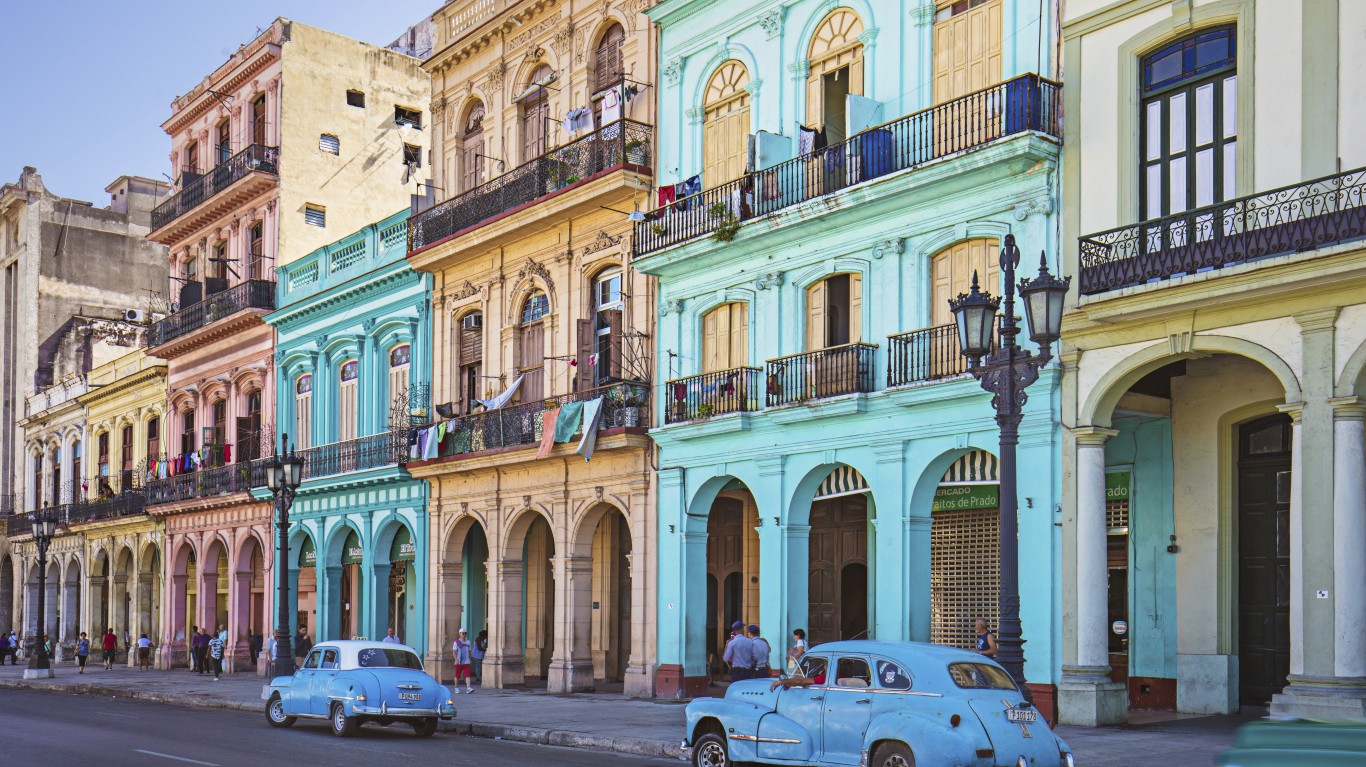
17. Cuba
> Population: 11.3 million
The name Cuba, an abbreviation of the indigenous word “Cubanacán,” which means “center place,” is a reference to its location in the center of the Caribbean archipelago the Antilles.
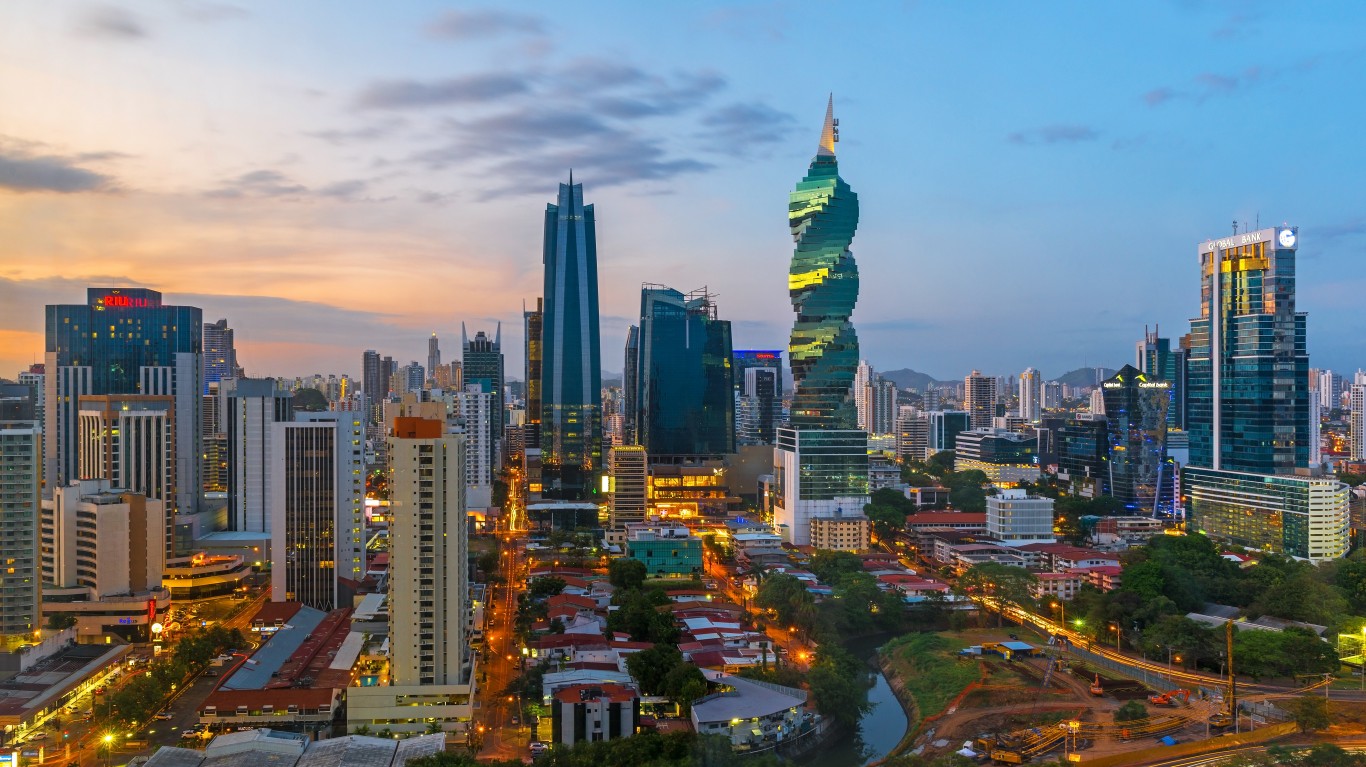
18. Panama
> Population: 4.2 million
Panama’s name may come from a word from the indigenous Guarani word people that is said to mean “place of many fish.” Given that the Central American country borders the Atlantic and Pacific oceans, this is not surprising.
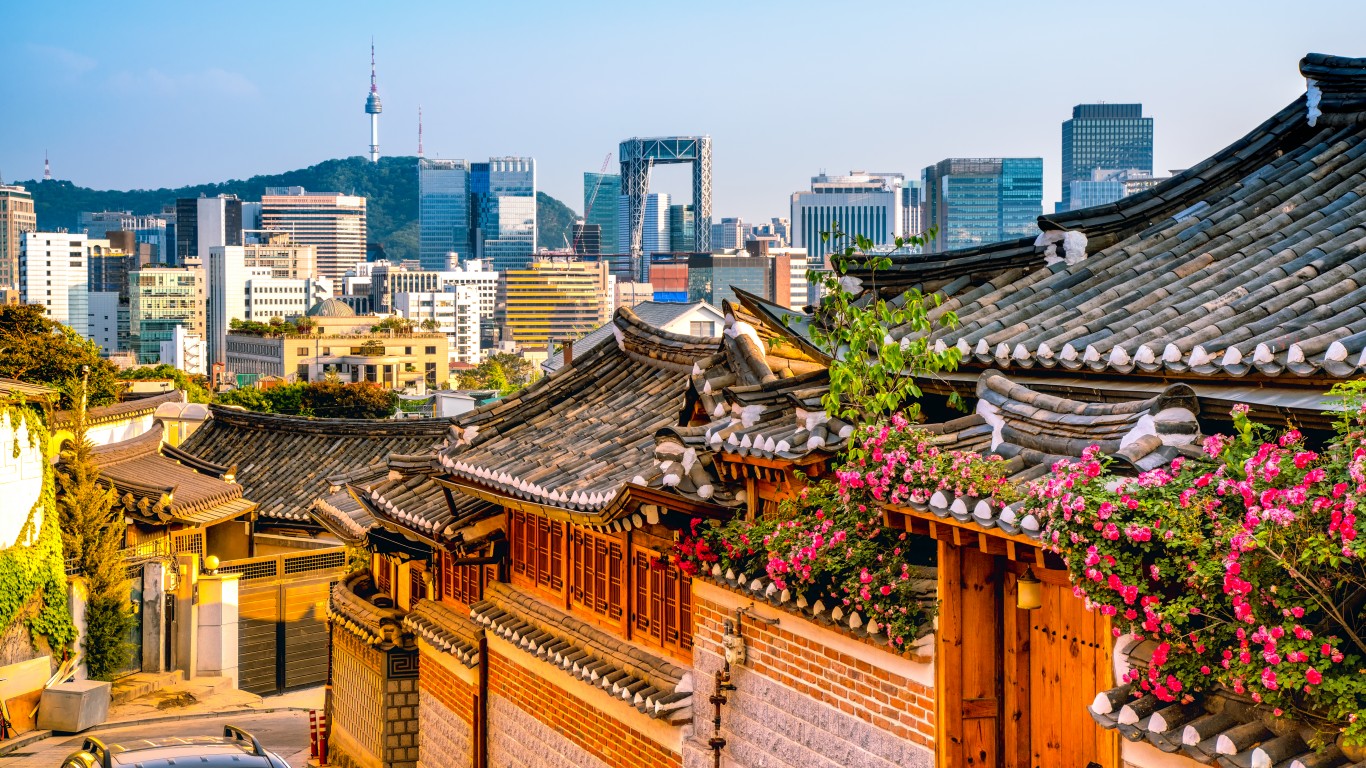
19. Korea
> Population: 51.6 million
The name Korea has origins from the time of Marco Polo. The dynasty ruling what is now Korea called itself Goryeo. That word became transliterated into “Cauli” in Italian. “Korea” was then transliterated from that word. A term for the area translates into English as “land of the morning calm.”
[in-text-ad-2]
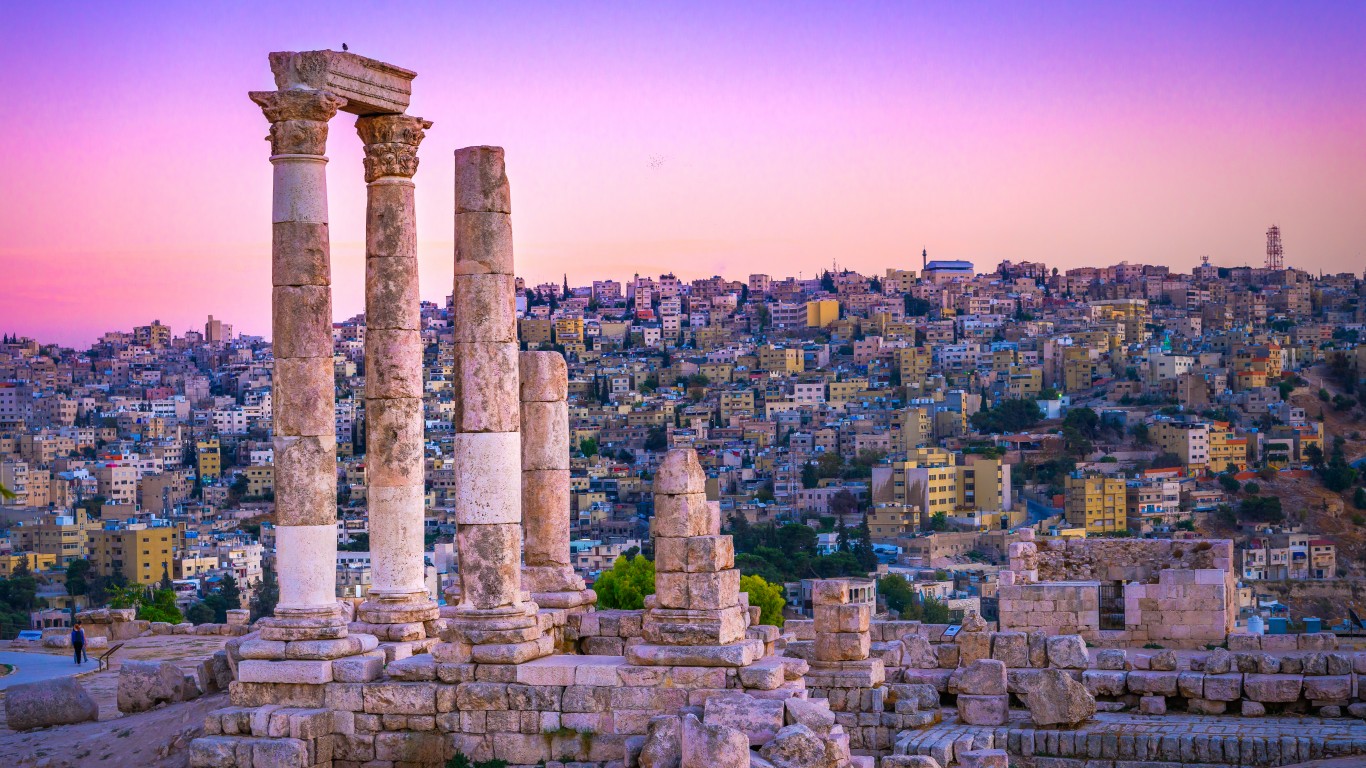
20. Jordan
> Population: 9.9 million
Jordan’s name has ancient roots from the river Jordan. The Jordan flows from the Sea of Galilee south to the Salt Sea. The river’s name in Hebrew is ×ַרְ×Öµ× (Yarden), which is derived from ×Ö¸×¨Ö·× (yarad), which means “descend” or to “flow down.”
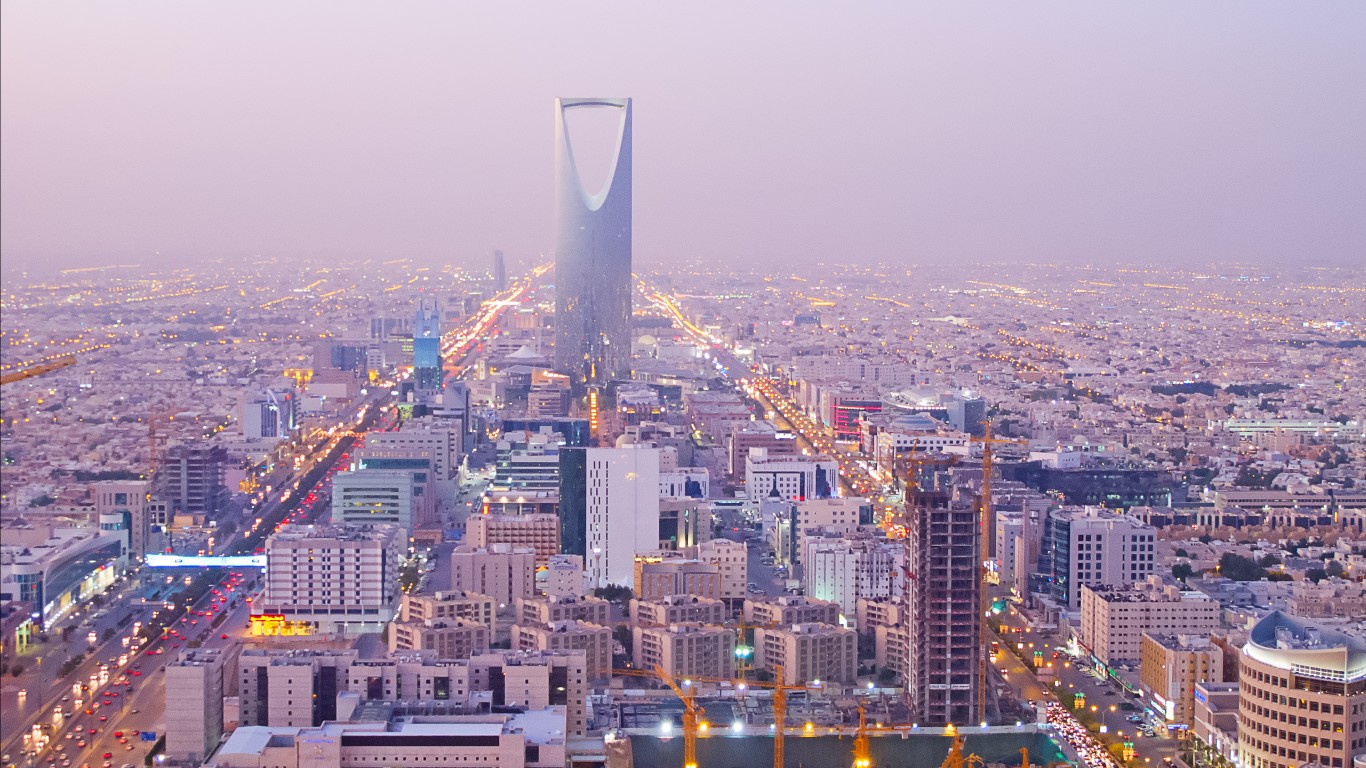
21. Saudia Arabia
> Population: 33.7 million
The name Saudi Arabia comes from the ruling family, Sa’ud. The name comes from the Arabic word “sa’d,” meaning “good fortune, happiness.”
[in-text-ad]
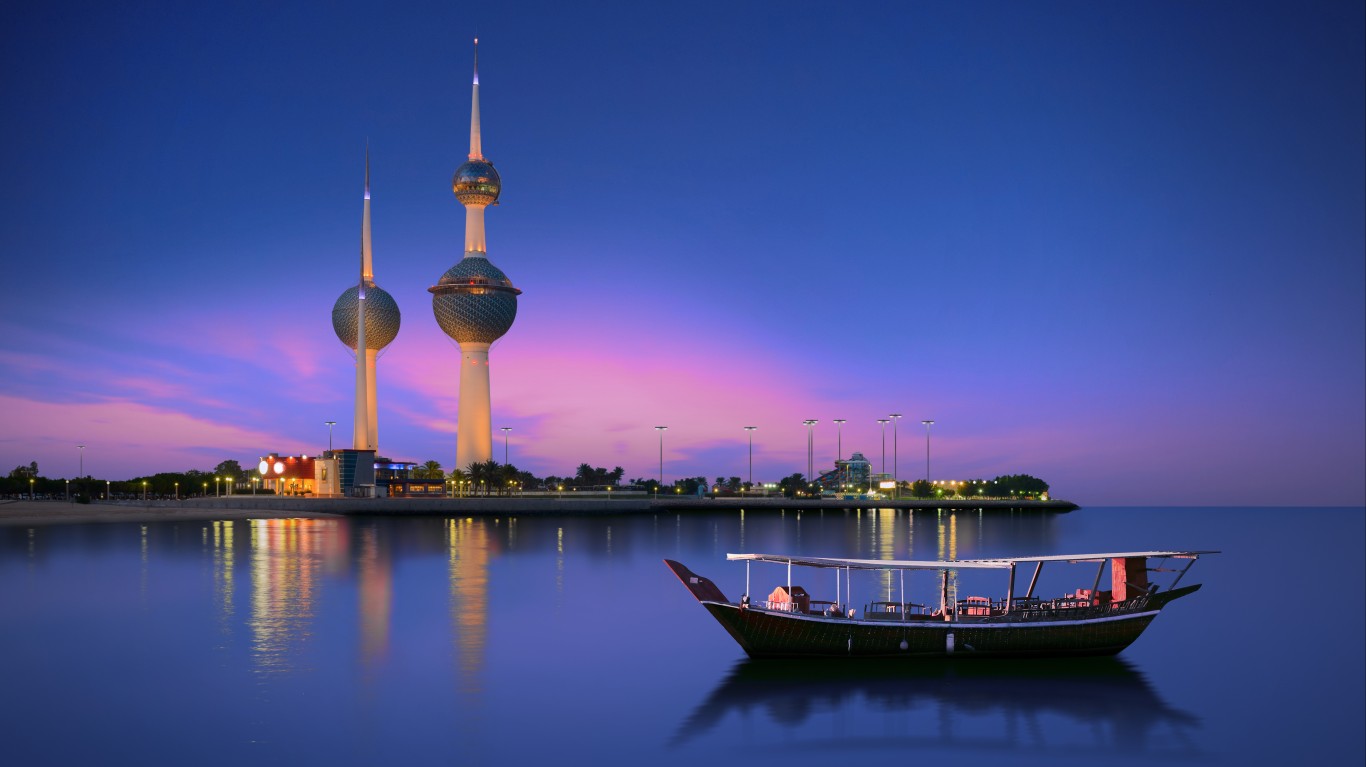
22. Kuwait
> Population: 4.1 million
The name of the tiny country on the Arabian Peninsula comes from the Arabic word “kut,” a specific regional term for a fortified house with surrounding land and a moat.

23. Iraq
> Population: 38.4 million
The name Iraq is possibly derived from the Arabic word “araqa,” which refers to something that is “perspiring, deeply rooted, or well-watered.” The name also might be from the ancient Sumerian city Uruk. The Sumerian, word “uru” means “city.”
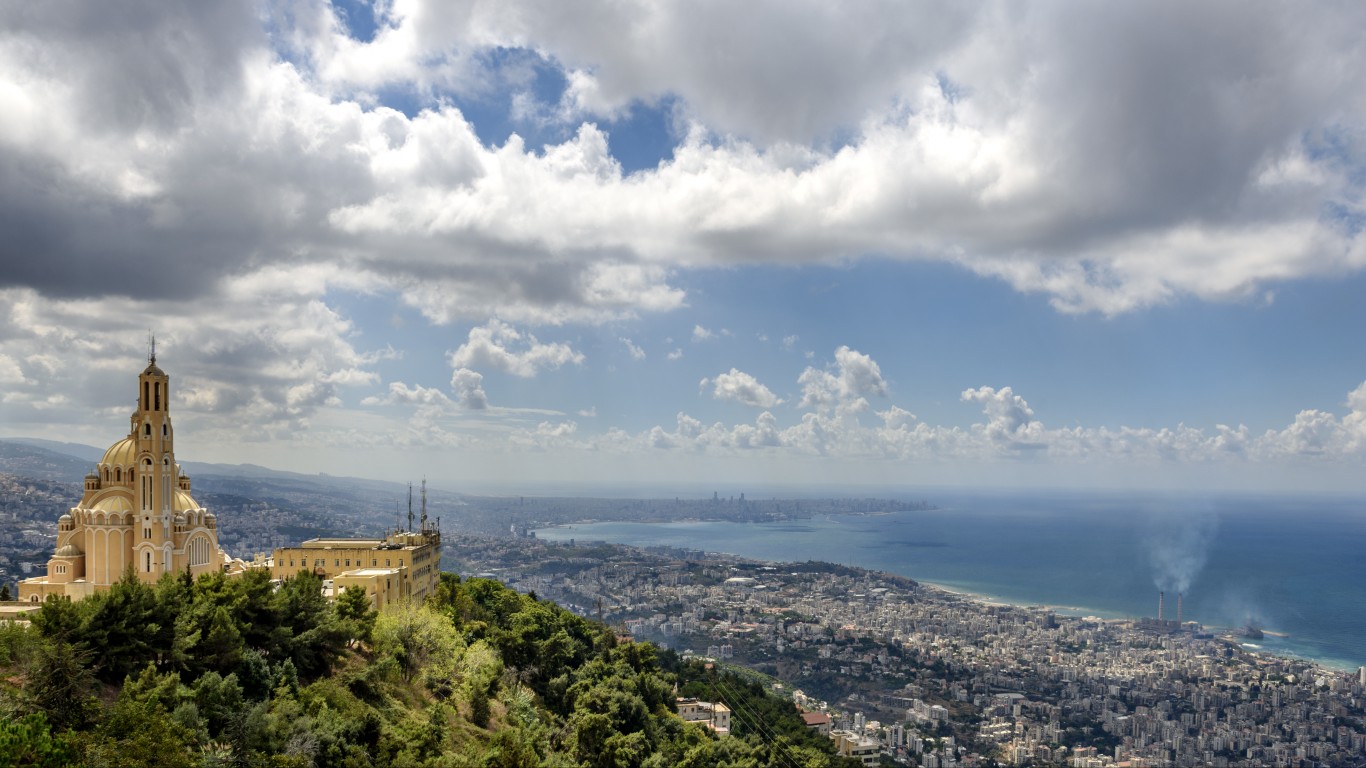
24. Lebanon
> Population: 6.8 million
The name of the small nation on the eastern shore of the Mediterranean Sea that is known for its cedar trees is derived from the Semitic root “l-b-n” or “white.” In all likelihood, this is a reference to either the country’s snow-capped peaks or to its limestone cliffs.
[in-text-ad-2]

25. Bhutan
> Population: 754,000
Bhutanese people refer to their nation as Druk-yul, the original name, which means “Land of the Thunder Dragon.” The British named the country Bhutan, and that may be derived from the Indian term “Bhotania,” or “end of the land of the Bhots.”
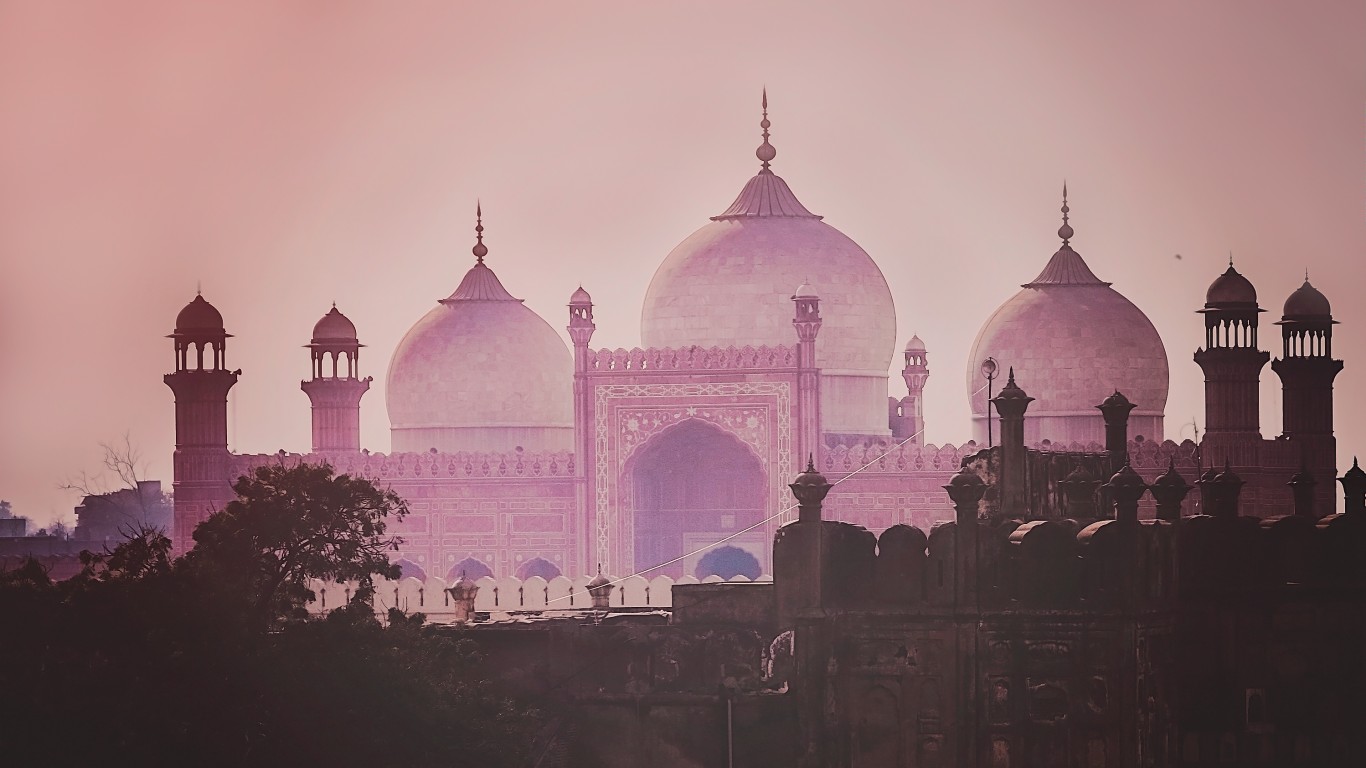
26. Pakistan
> Population: 212.2 million
Pakistan, created from India following independence from the British Empire, was a name apparently created in the 1930s by Muslim students at Cambridge University. It was an acronym for three regions — Punjab, Afghan Province, and Kashmir — and was also a play on words for the Iranian word “pak,” or “pure.”
[in-text-ad]
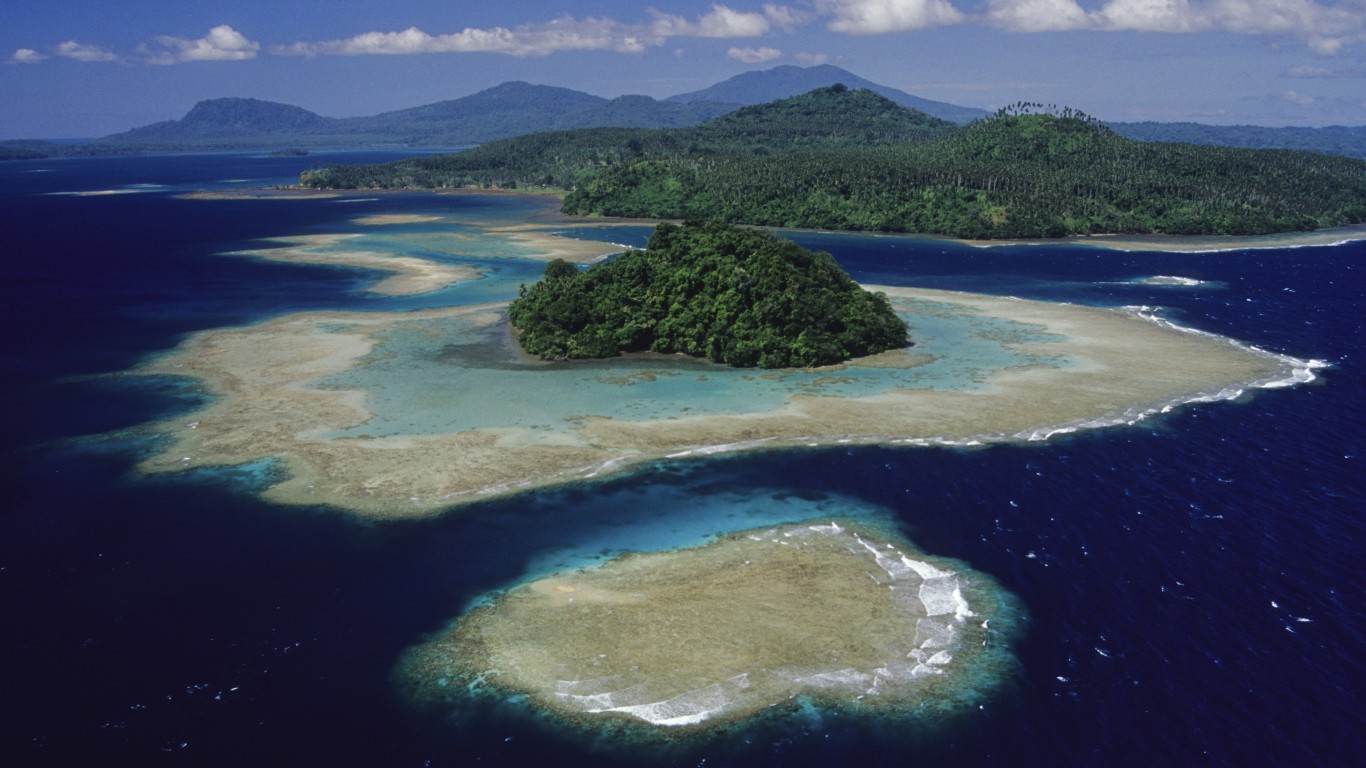
27. Papua New Guinea
> Population: 8.6 million
Papua, explored by the Spanish in 1545, called the island Nueva Guinea. Papua likely comes from the Malay word “papuwah, which means “fuzzy hair.”
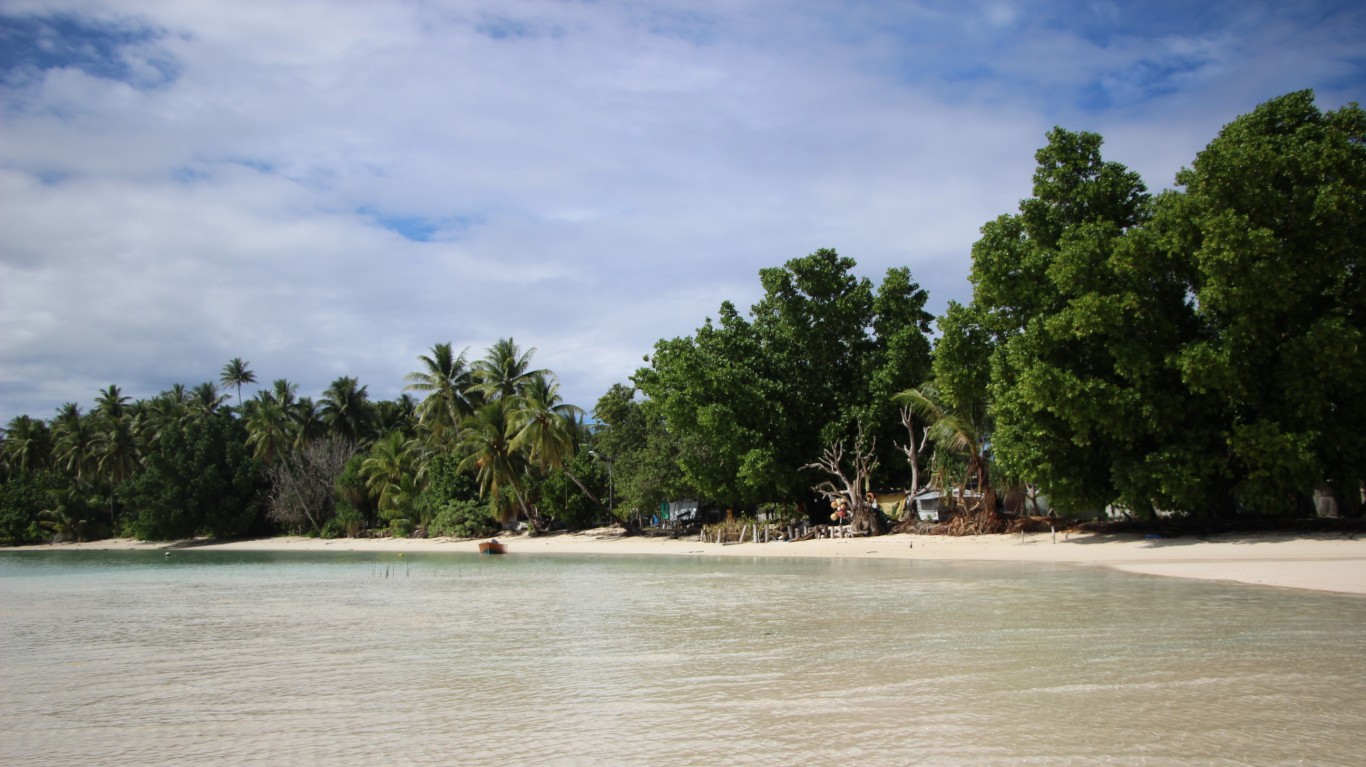
28. Tuvalu
> Population: 11,500
The name Tuvalu roughly translates to “eight traditions,” although some sources say it means “eight standing together.” Eight inhabited islands make up the nation of Tuvalu.
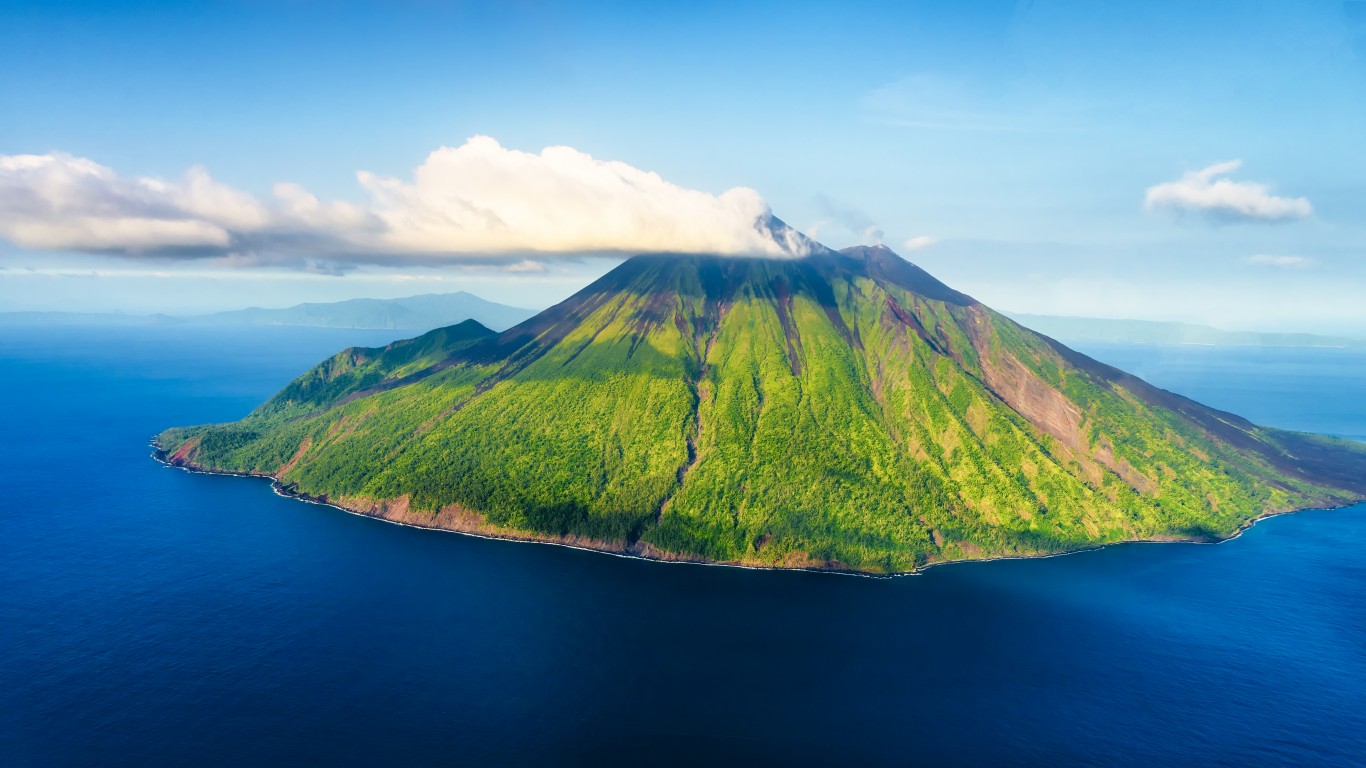
29. Vanuatu
> Population: 293,000
In Vanuatu, a South Pacific nation made up of about 80 islands, “vanua” means “land” in many of the country’s 105 languages. Some of the translations for the nation’s name include “abiding land.”
[in-text-ad-2]
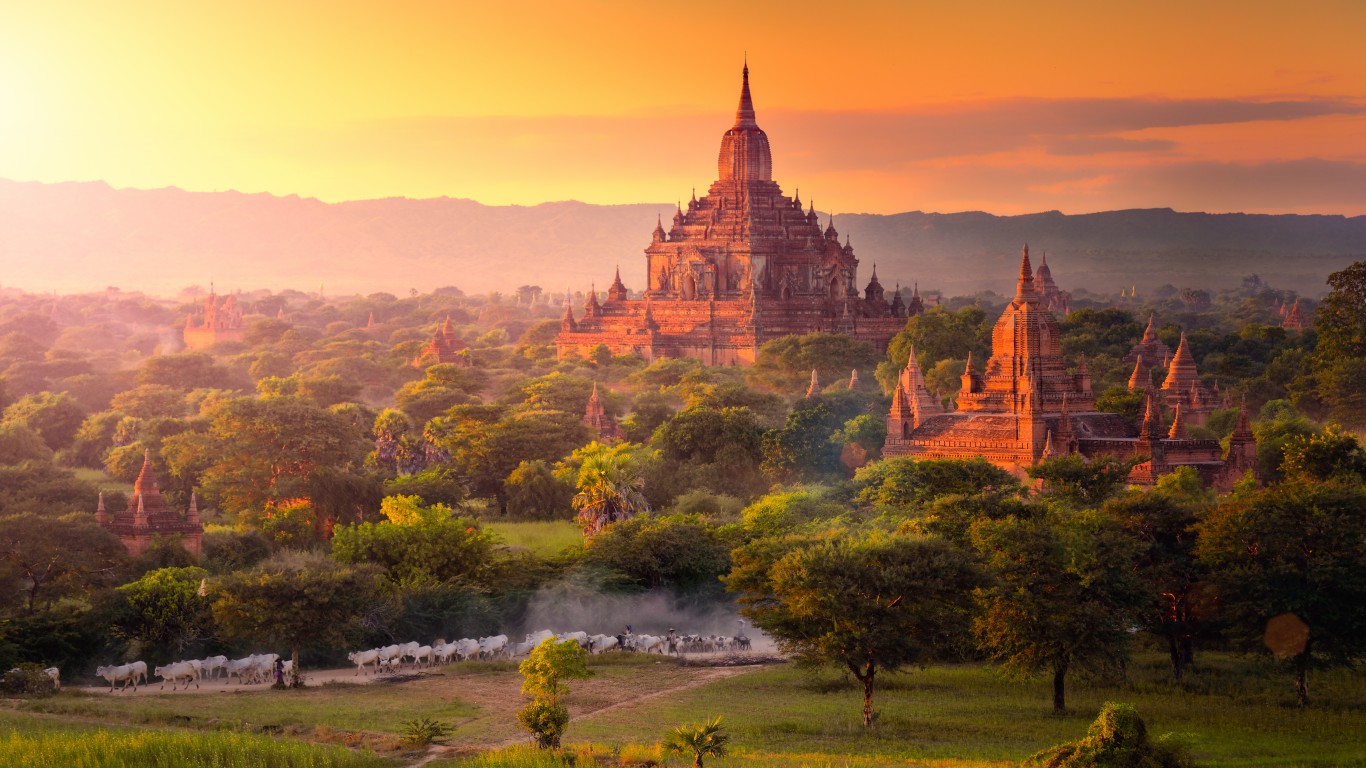
30. Myanmar
> Population: 53.7 million
The nation formerly known as Burma took the name Myanmar in 1989. The name has its origins in the country’s official Burmese name Myanma, which means “fast and strong people.”
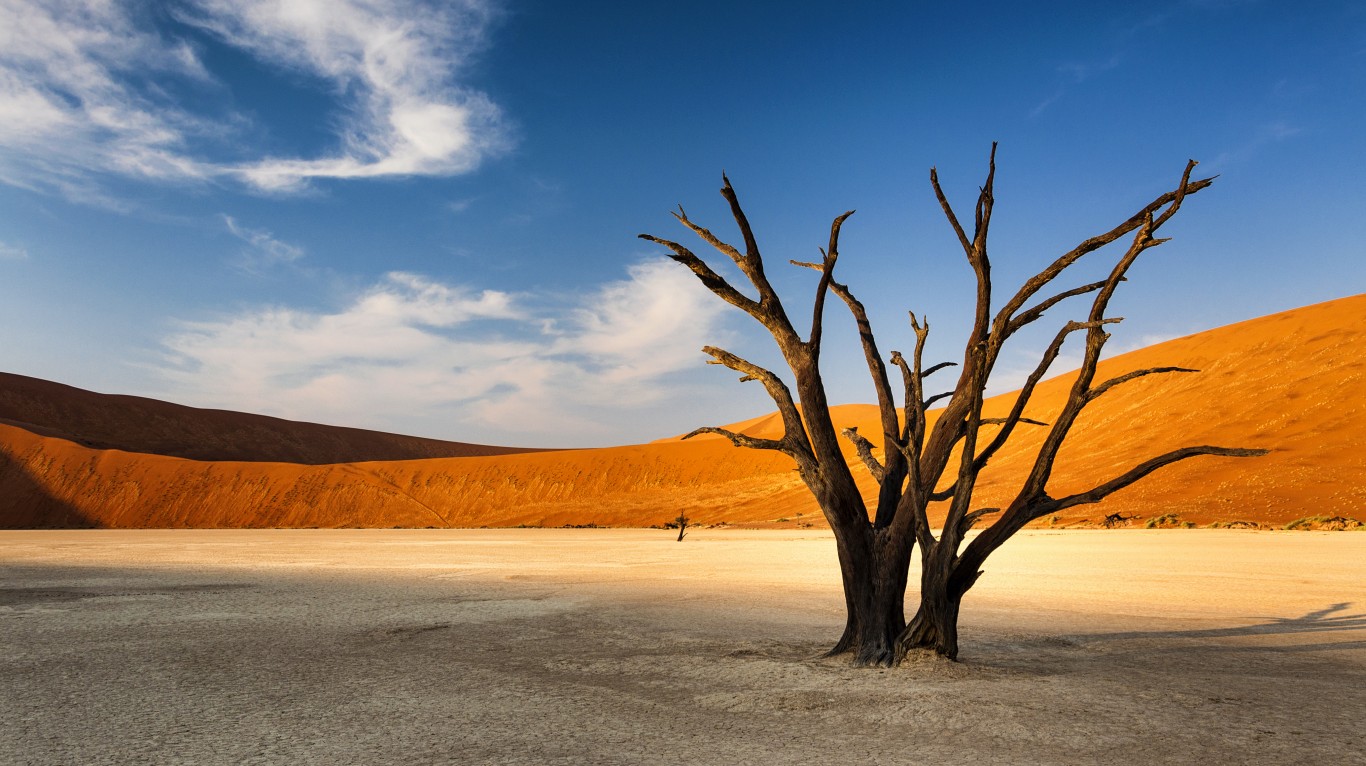
31. Namibia
> Population: 2.4 million
The name Namib translates as “vast place.” That’s appropriate since Namibia, a former German colony, is among the least-crowded nations on the planet.
[in-text-ad]
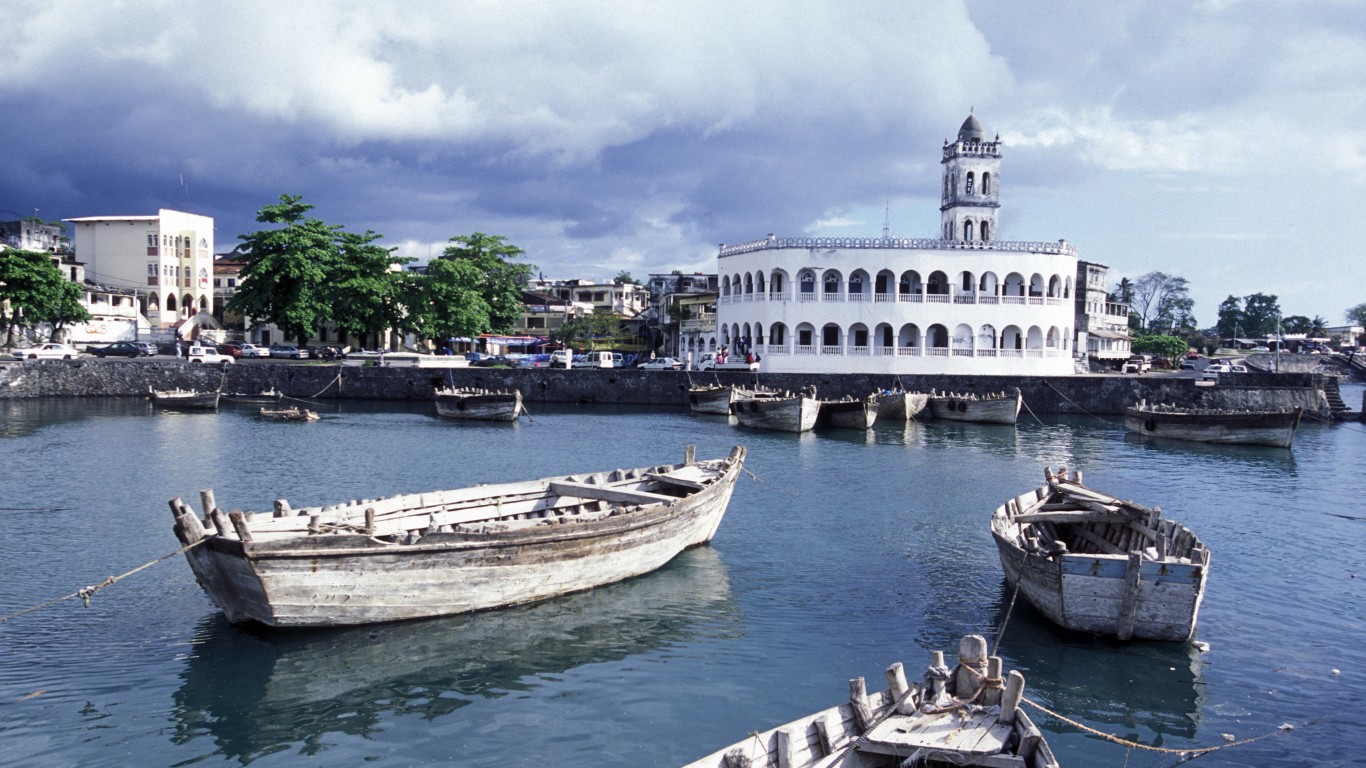
32. Comoros
> Population: 832,000
Residents of the island nation call their country Masiwa, meaning “the islands.” The name Comoros comes from the Arabic word “qumr,” meaning “the moon,” or “qamar,” meaning “whiteness.”
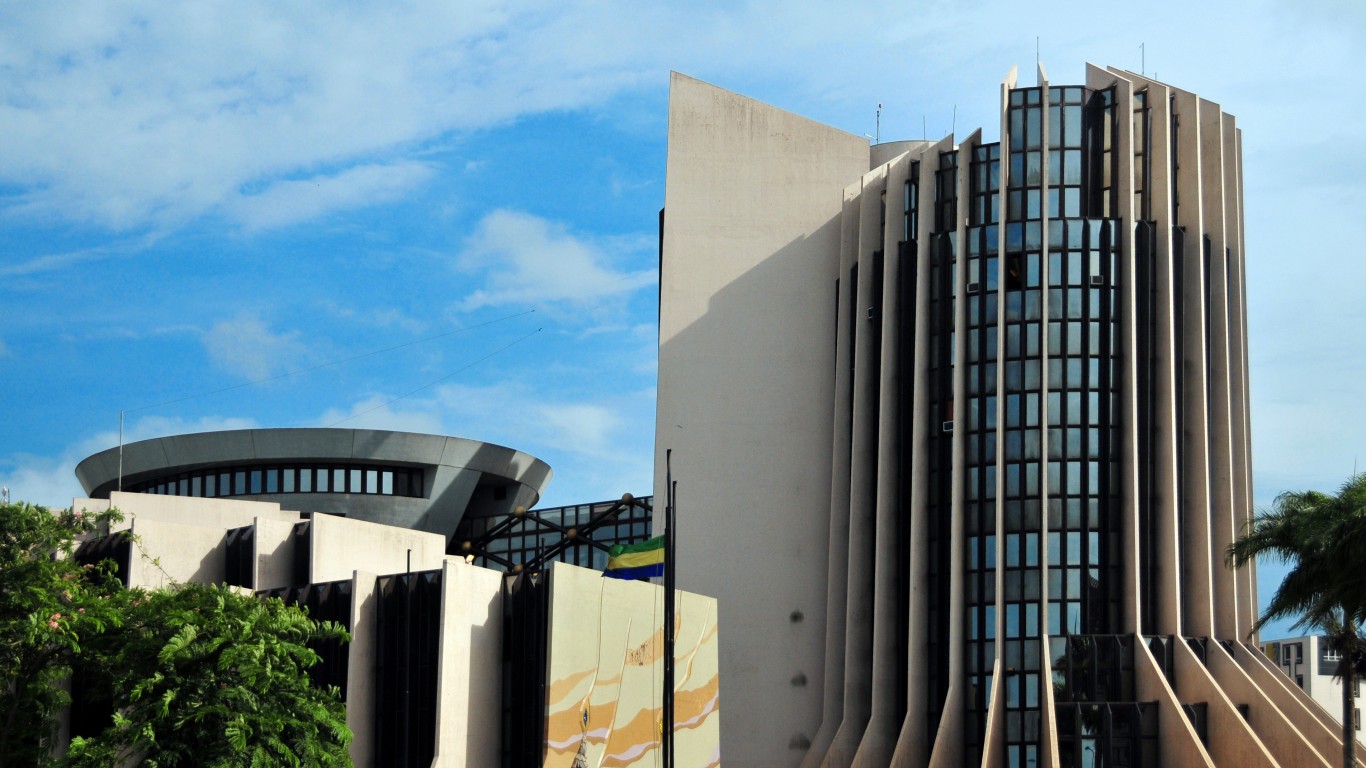
33. Gabon
> Population: 2.1 million
Portuguese explorers came to the region on the west coast of Africa in the late 15th century. Gabon is derived from the Portuguese word for hooded cloak — “gabao” — because of the shape of the estuary of the Como River.
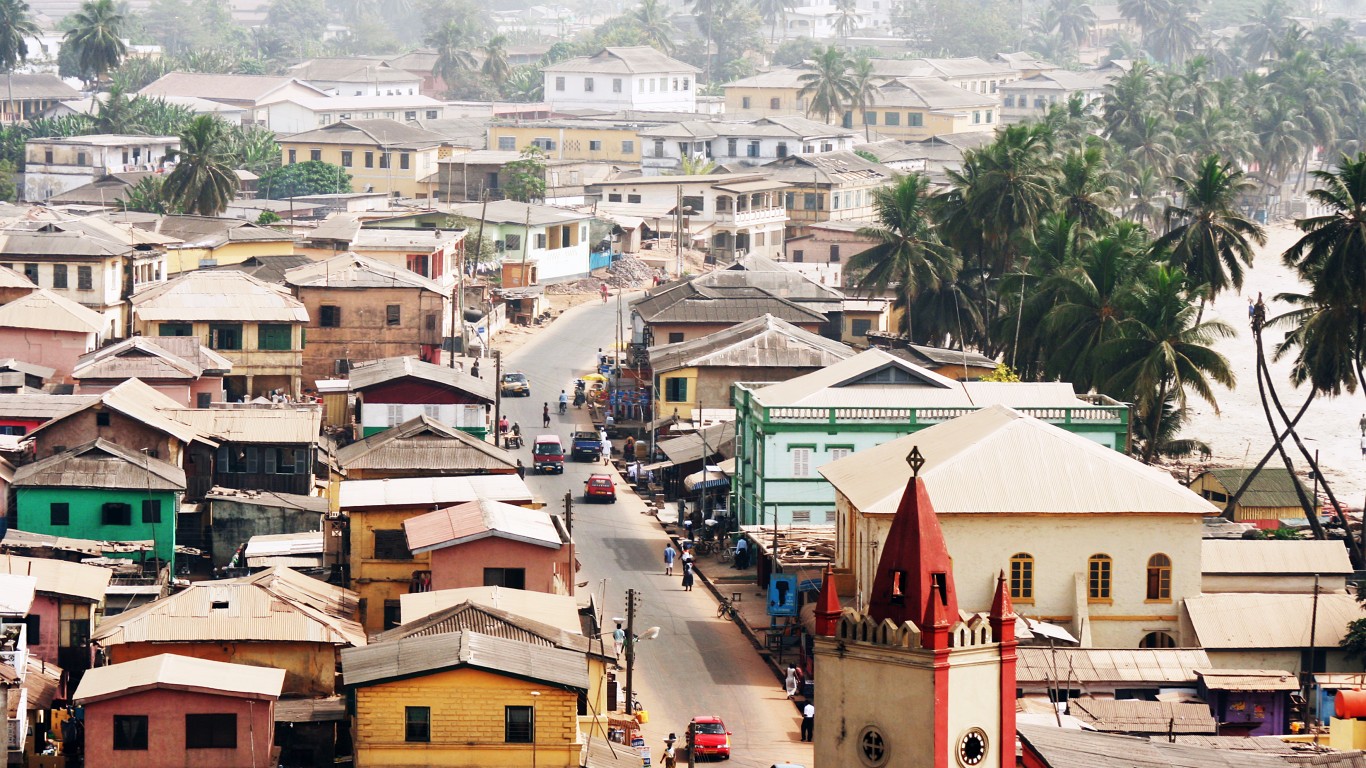
34. Ghana
> Population: 29.8 million
The nation has been called Ghana since 1957. It takes its name from the king’s title, “ghana.”
[in-text-ad-2]
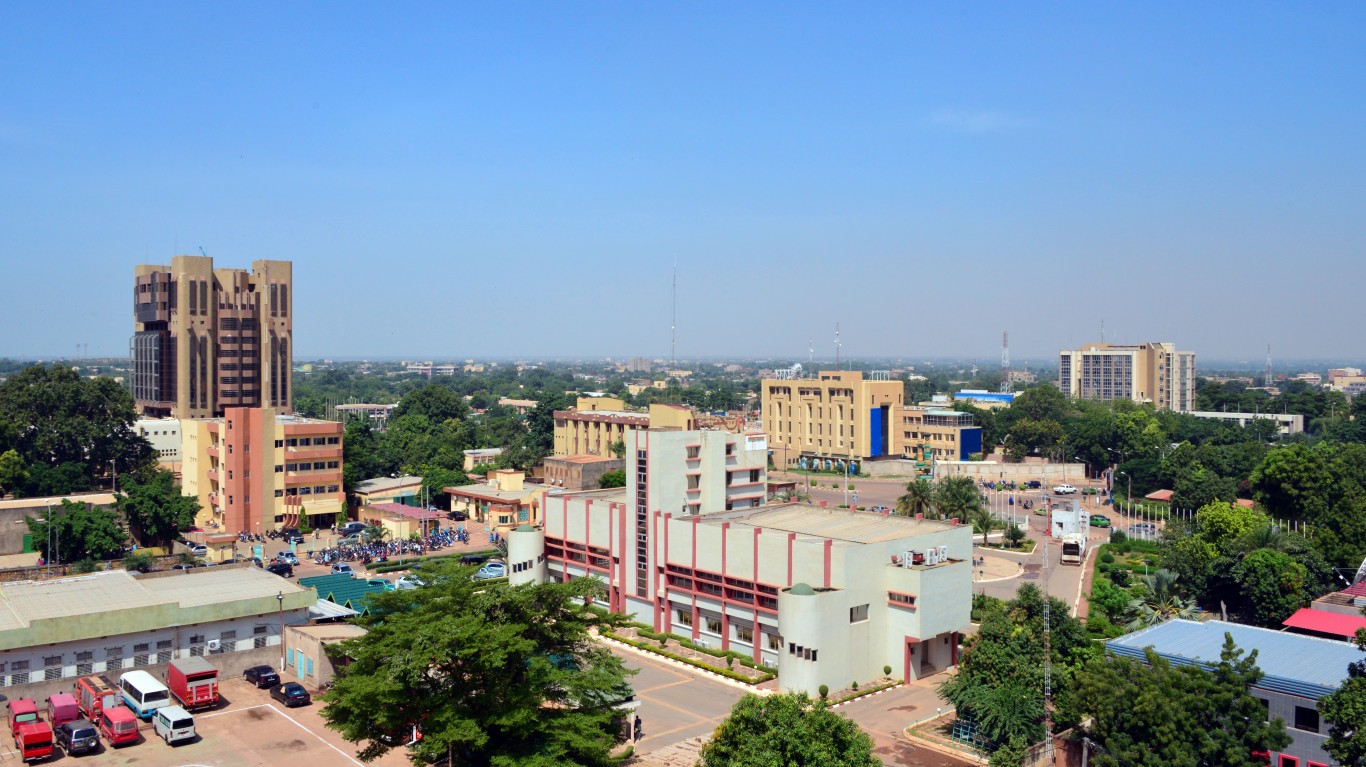
35. Burkina Faso
> Population: 19.8 million
The nation jettisoned the name Upper Volta in 1984 and became Burkina Faso. The name fused linguistic elements from the country’s various languages: Burkina means “free man” in the Mooré language, and Faso means “land” in Dyula.
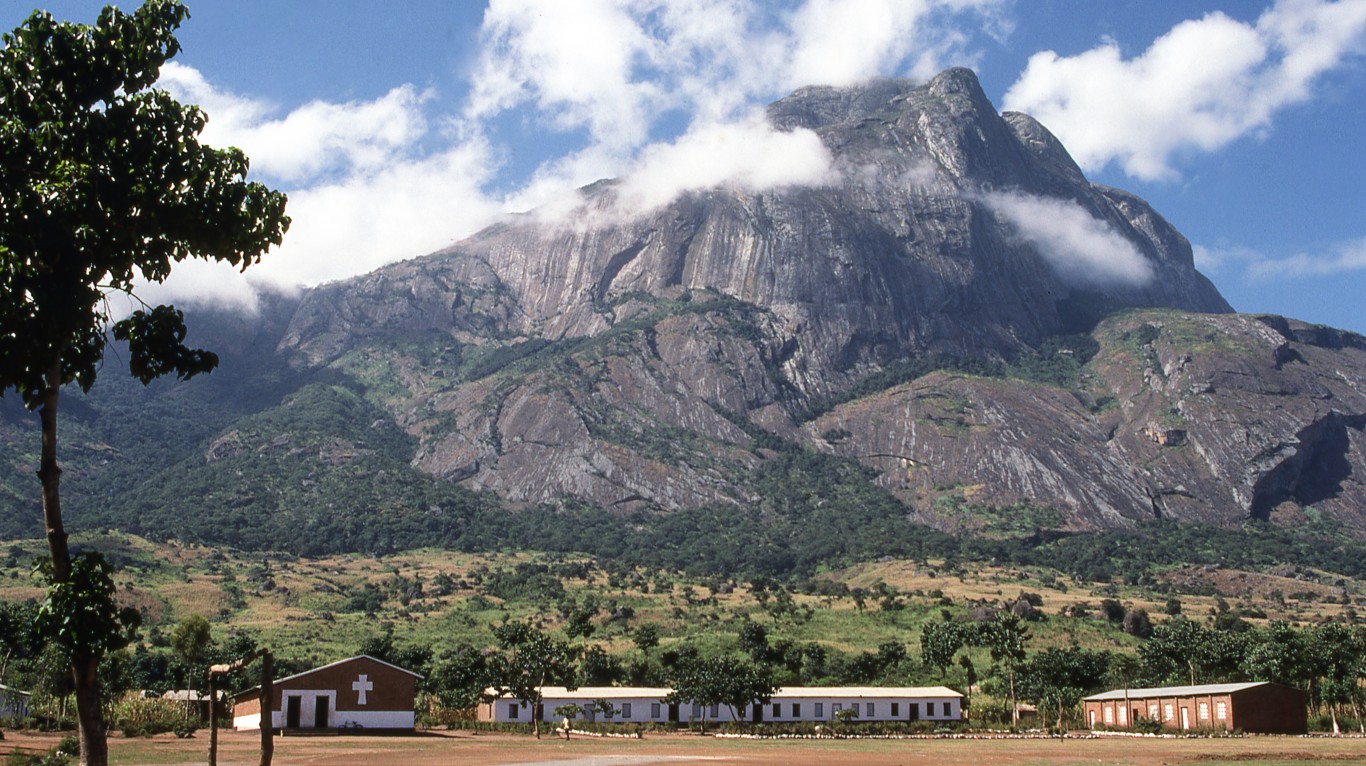
36. Malawi
> Population: 18.1 million
The meaning of Malawi, a landlocked African nation, is the from indigenous people name for “fire flames.” That image can be seen on the nation’s flag, showing a bright red sun on the horizon.
[in-text-ad]
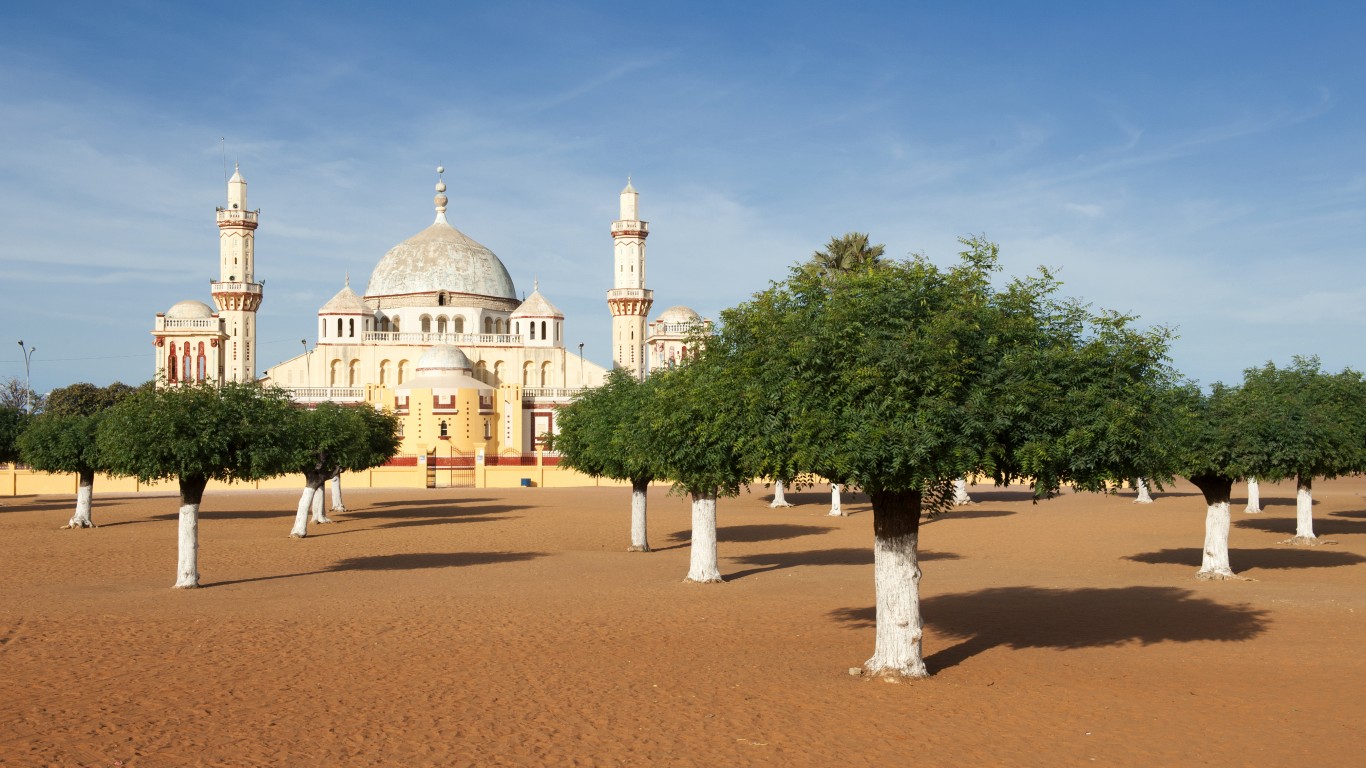
37. Senegal
> Population: 15.9 million
Senegal takes its name from the river on its northern and eastern borders that creates the boundary with Mauritania and Mali. The etymology of the name is from the local term “sunugal,” meaning “our dugout canoe.”
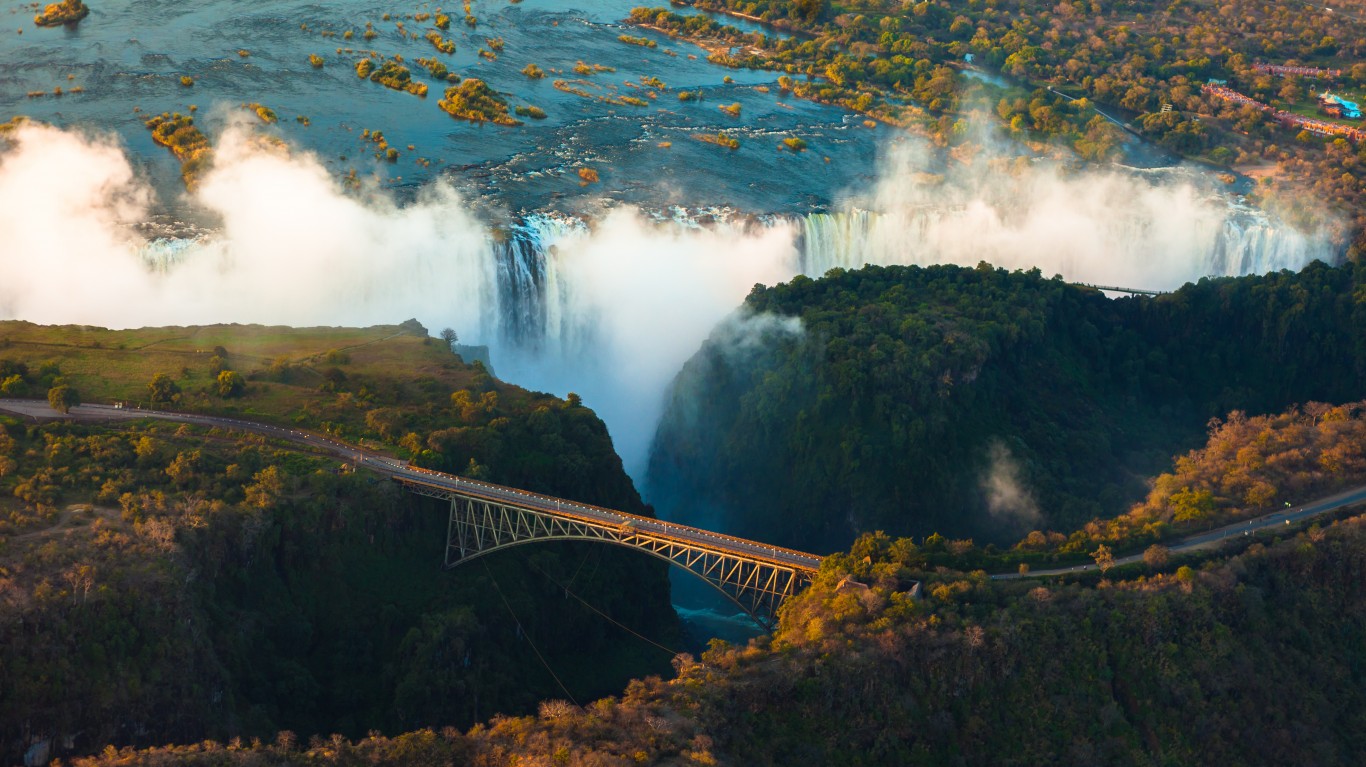
38. Zimbabwe
> Population: 14.4 million
Zimbabwe, called Rhodesia in colonial times, is named after Great Zimbabwe, a capital city built of stone that existed from the 12th to the 15th centuries. The name itself is believed to come from “dzimba dza mabwe” (great stone houses) or “dzimba waye” (esteemed houses).
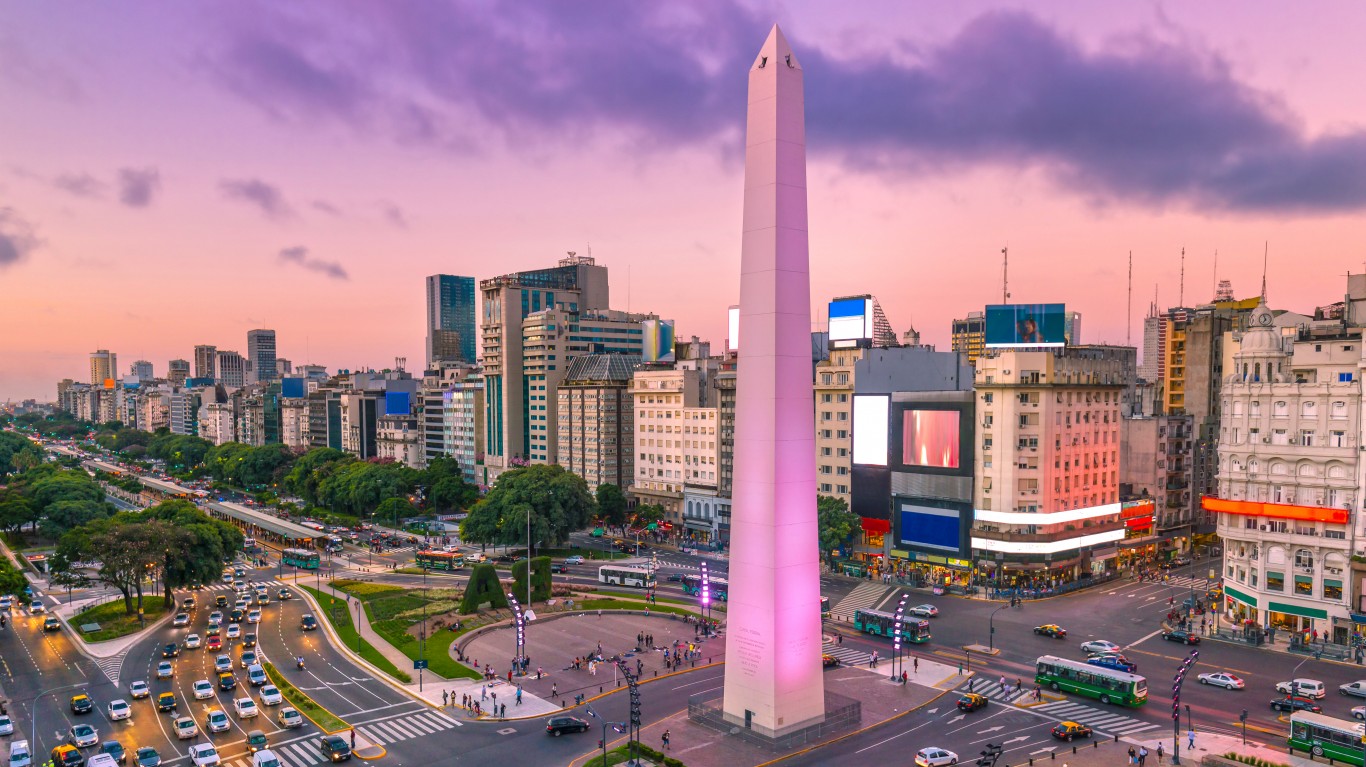
39. Argentina
> Population: 44.5 million
Argentina is derived from the Latin word for silver. The root of the name, arg, means “to shine” or “white.” Silver — a bright, shiny metal — is a commodity the Spanish thought they would find there.
[in-text-ad-2]
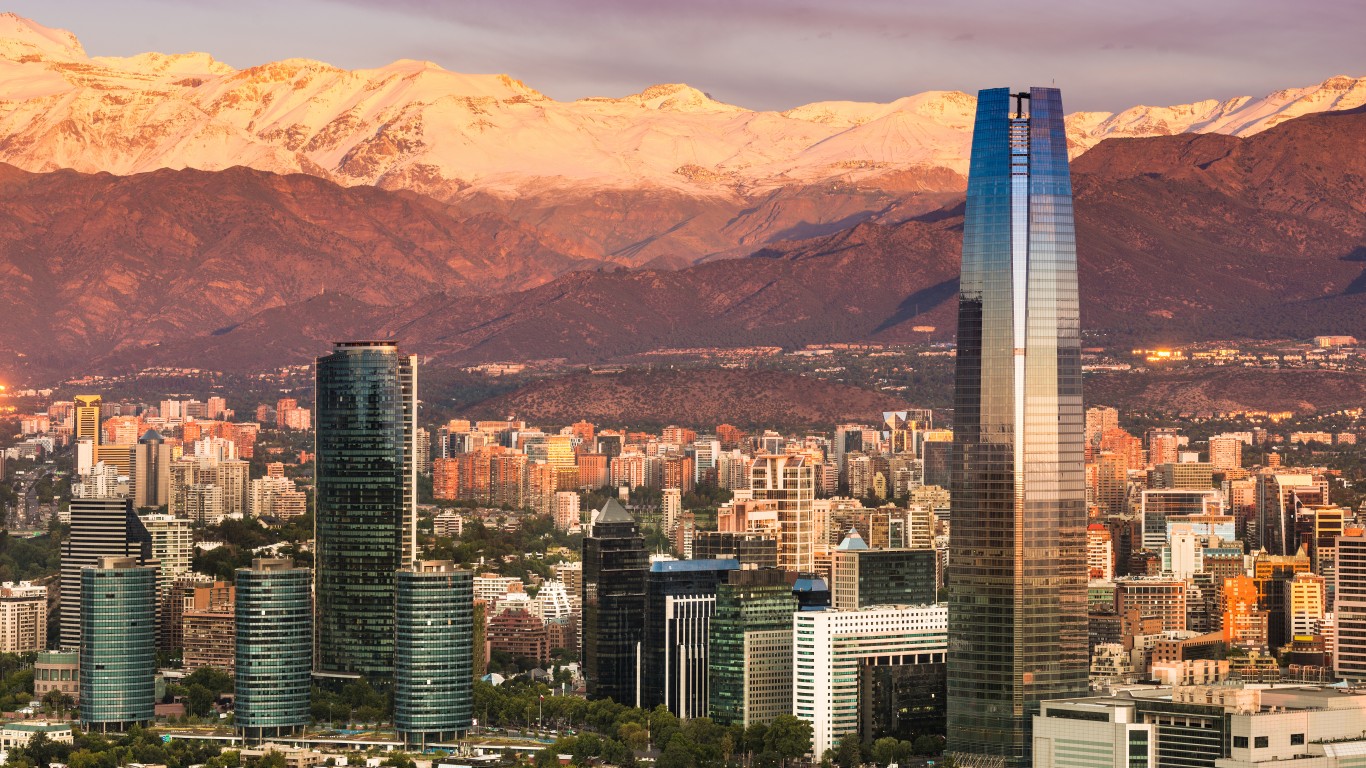
40. Chile
> Population: 18.7 million
The most commonly accepted explanation for the name of Chile, the longest country on the planet with a coastline about 2,700 miles, is that it comes from the indigenous Aymará word “chilli” meaning “the land where the earth ends.”
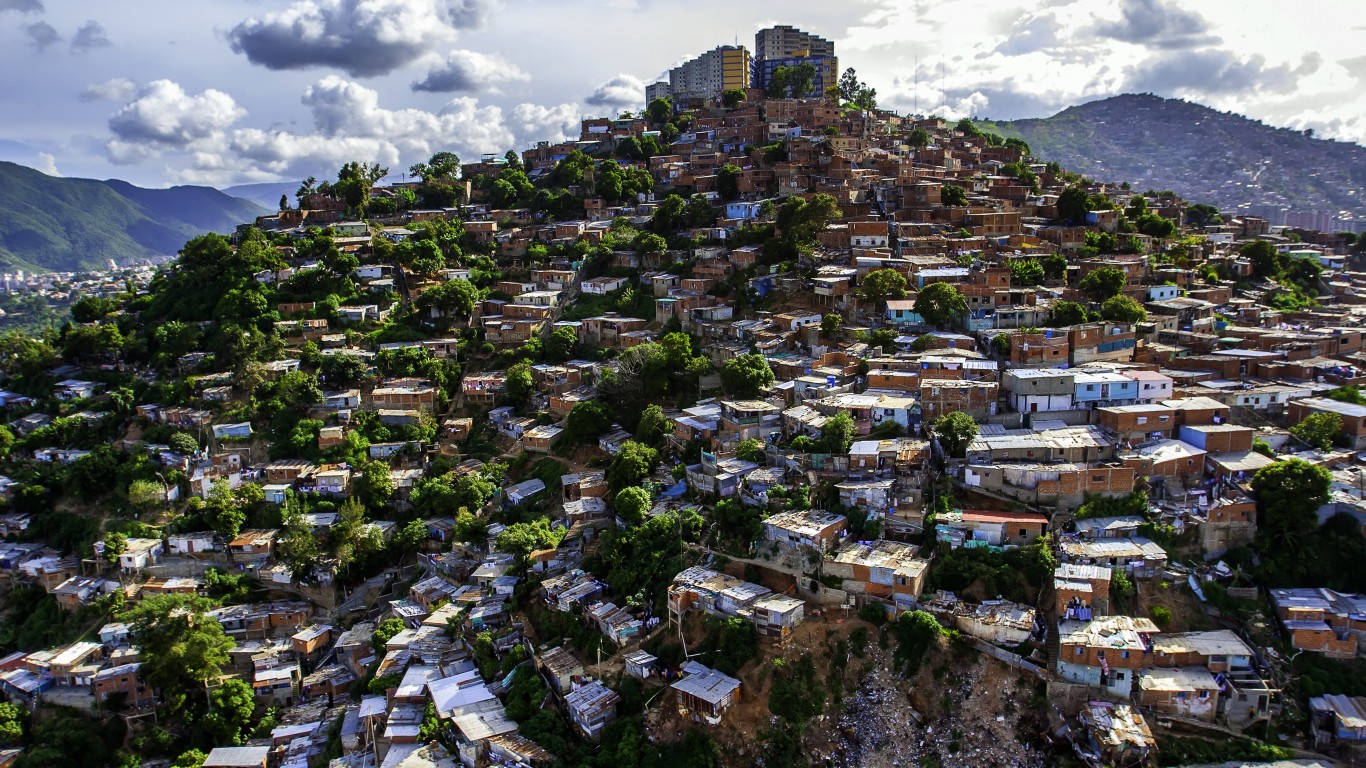
41. Venezuela
> Population: 28.8 million
Alonso de Ojeda, who sailed with Christopher Columbus on his third voyage to the Americas, is credited with naming Venezuela. While scouting Venezuela’s northern coast, Ojeda saw that the houses of indigenous people were located on stilts above the Orinoco River, so he named it Venice. The region was eventually called the CapitanÃa General de Venezuela when it became a colony under Spanish rule.
[in-text-ad]

42. France
> Population: 67 million
It’s no surprise that France owes its name to the German tribe the Franks. The name comes from an old German word “franka,” which means “fierce.”
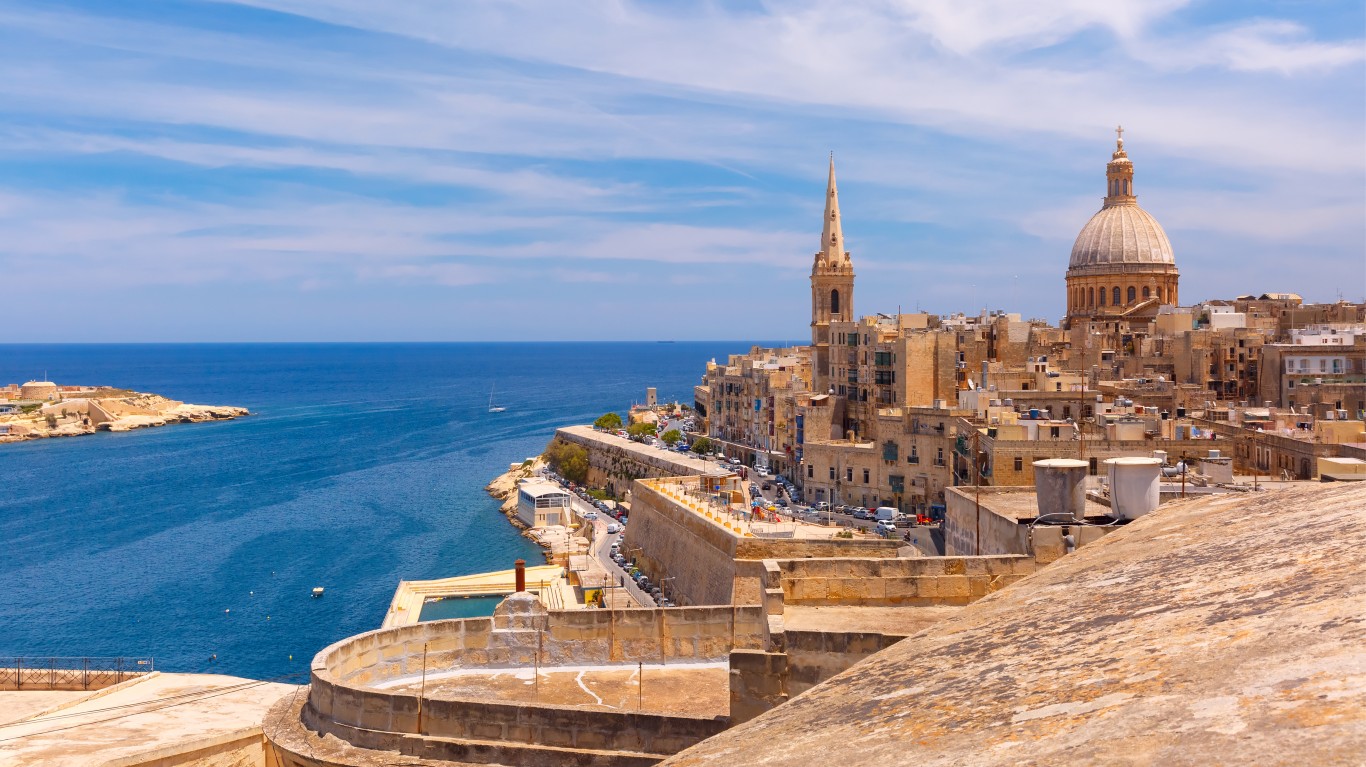
43. Malta
> Population: 484,000
The Mediterranean island whose geographic location has played a key role in European history derived its name either from the Latin word “melite,” or possibly from the Phoenician “melita,” which means “place of refuge.”
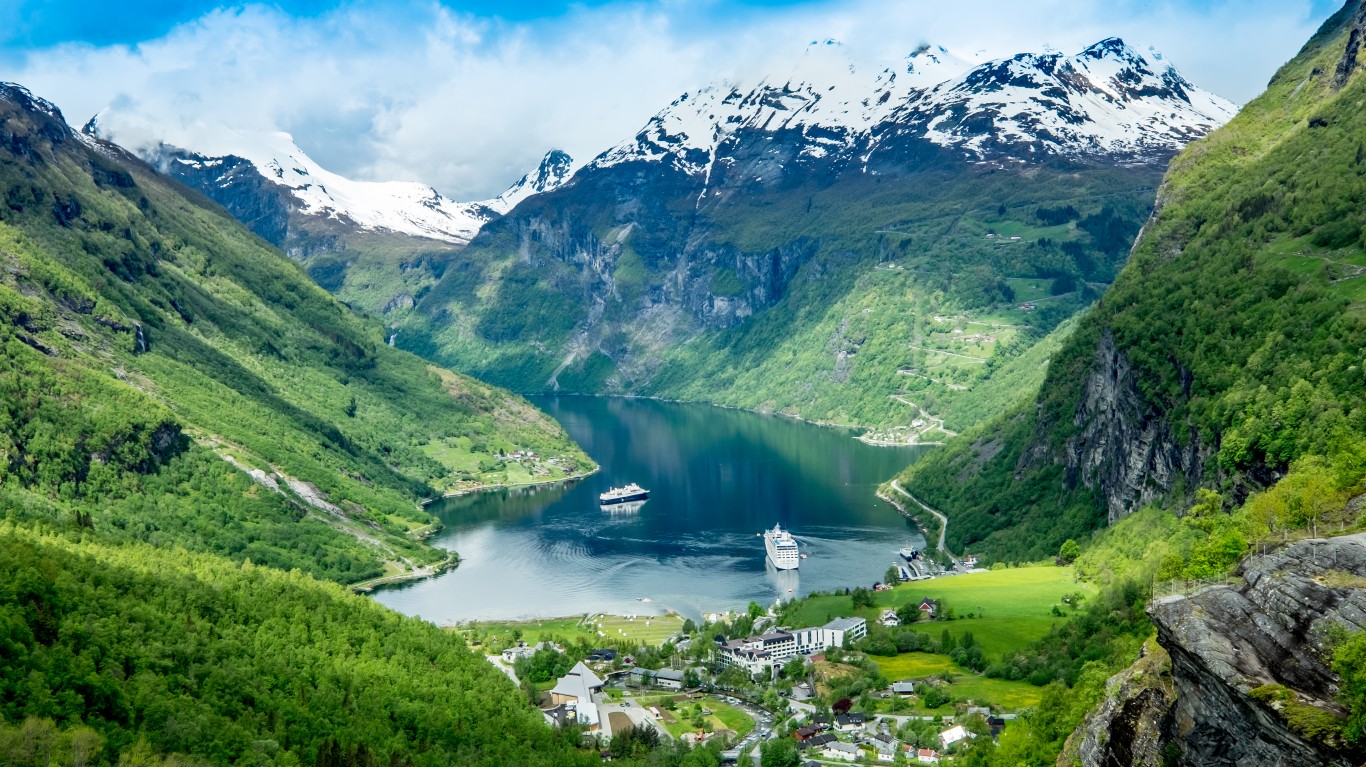
44. Norway
> Population: 5.3 million
Norway’s name means “the way north” and refers to a Viking route. The name is found in the Middle English “Nor-weie,” the Old English “Norweg,” and also in the Old Norse “Norvegr,” meaning “north way, a way leading to the north.”
[in-text-ad-2]
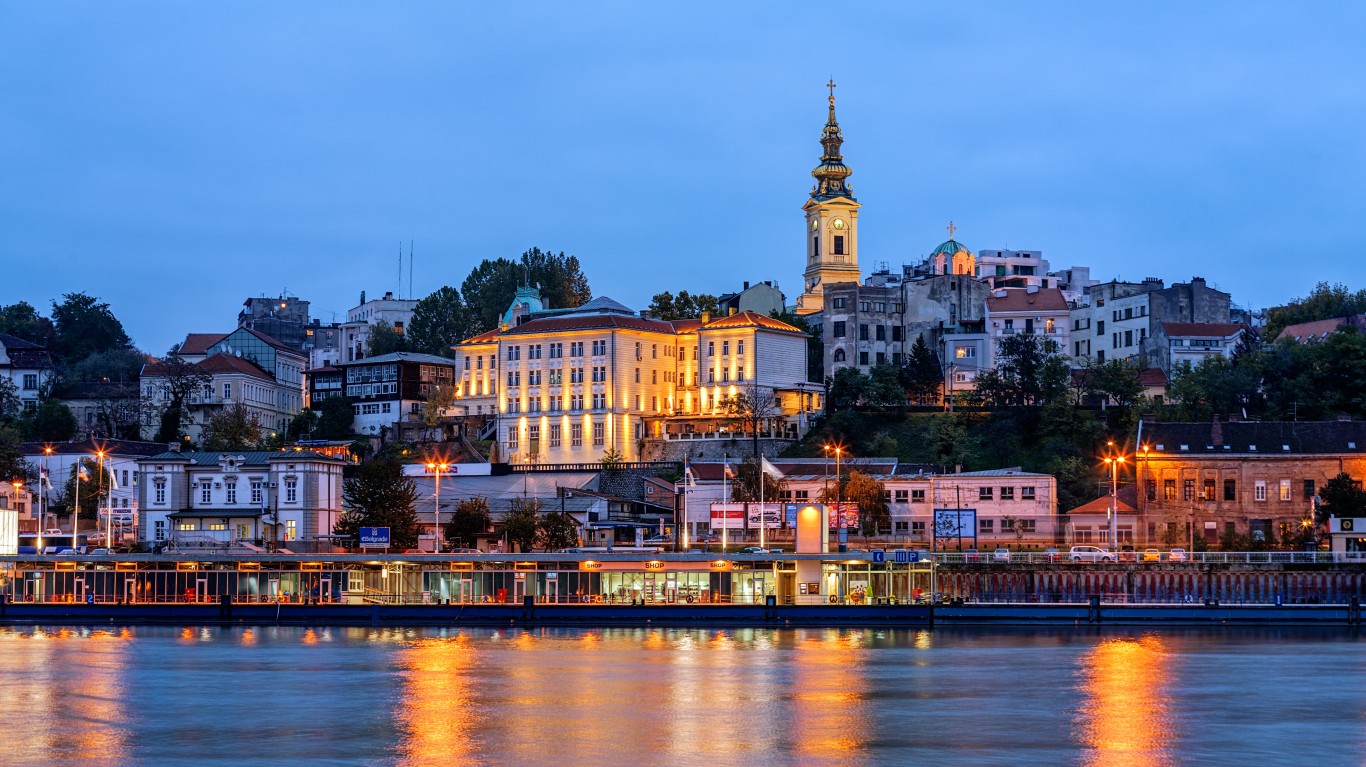
45. Serbia
> Population: 6.9 million
The name of the nation Serbia comes from the Serbian “Srb,” which may be from a root that likely means “man.”
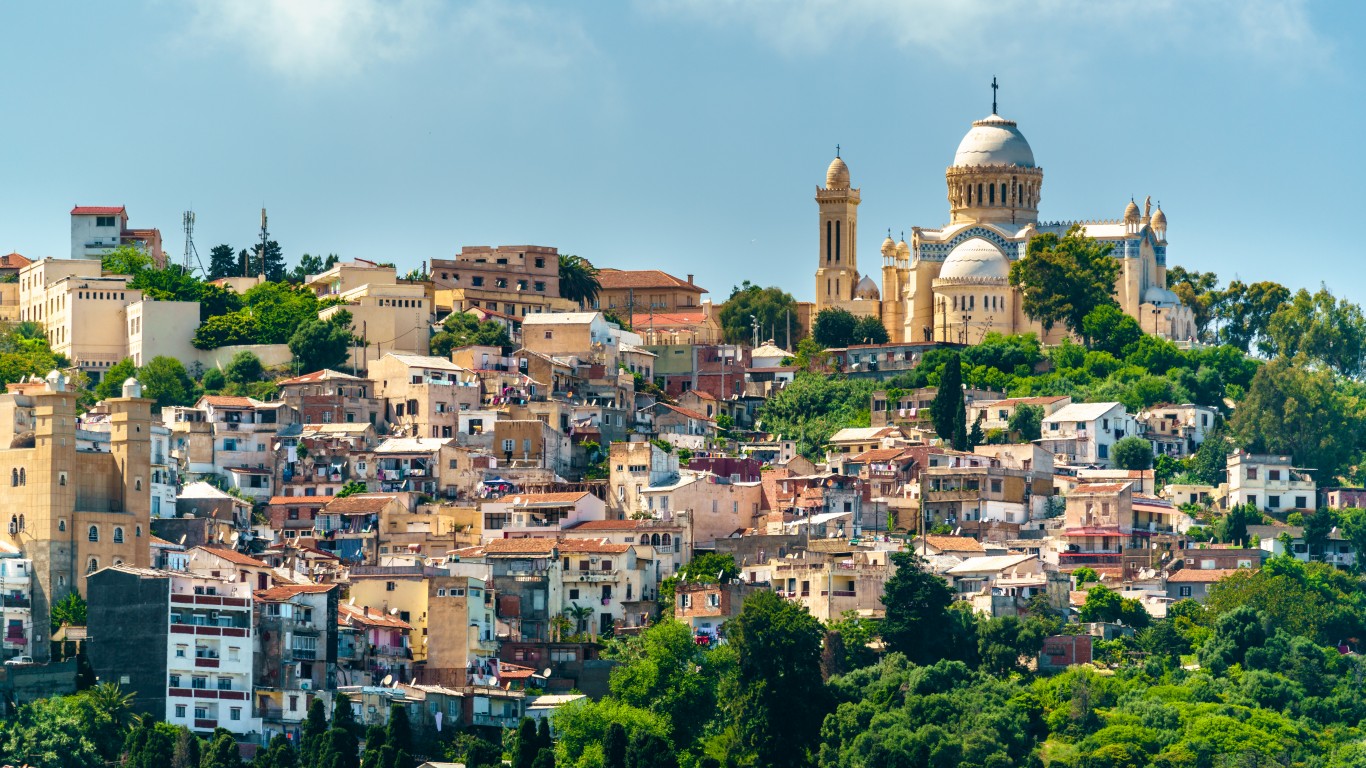
46. Algeria
> Population: 42.2 million
The North African country of Algeria is named after Algiers, which French colonists selected as the capital in the 19th century. Algers is from the Arabic “al-Jazair,” which literally means “the islands,” a reference to four islands that used to be located off the coast but became connected to the continent.
[in-text-ad]

47. St. Kitts & Nevis
> Population: 52,000
Christopher Columbus named both of these islands that form one nation, which is the smallest island nation in the Americas in area and population. He named one island after his patron saint, St. Christopher, that would later be shortened to St. Kitts. And he named the other island Nevis because it looked like a snow-capped mountain (the Spanish word for snow is “nieves”).
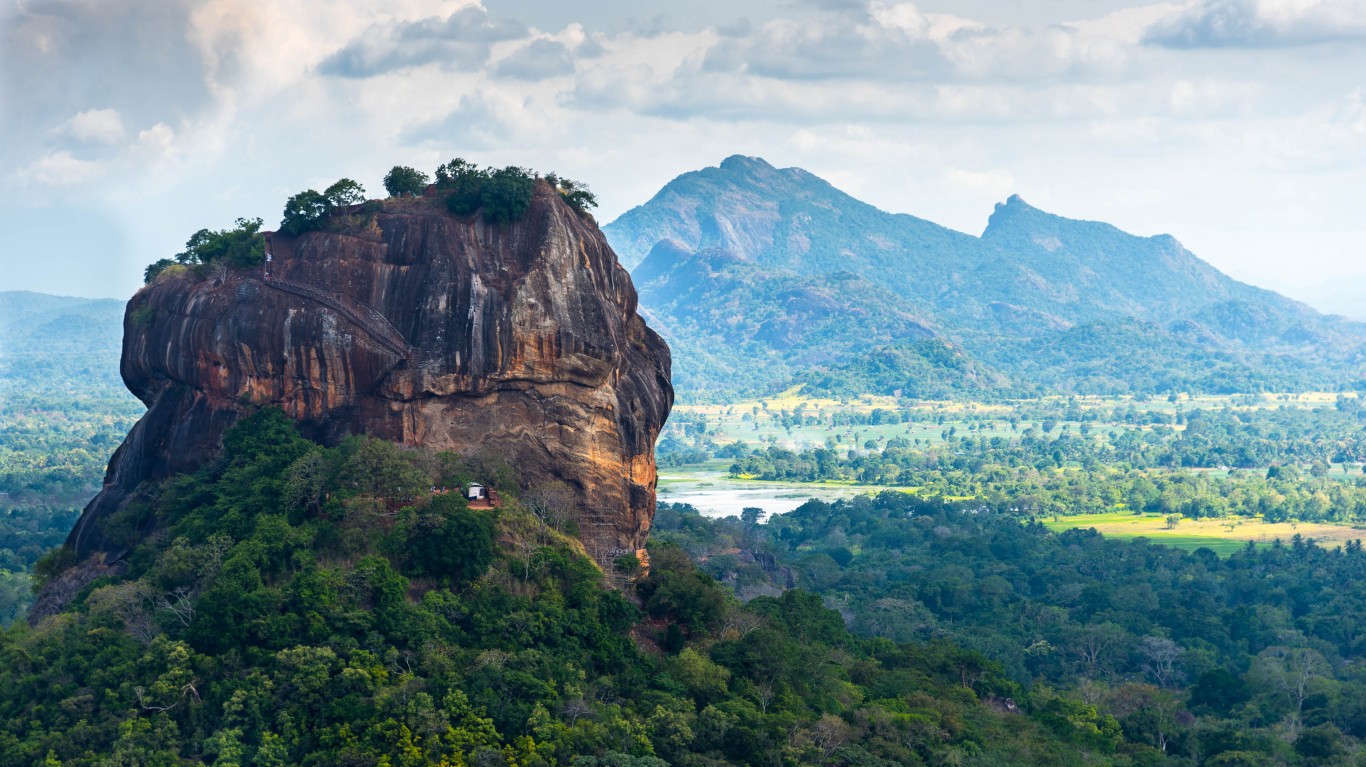
48. Sri Lanka
> Population: 21.7 million
This island nation was formerly called Ceylon. In the Sinhala language, Sri means “blessed” and Lanka is the name of the island.

49. Sierra Leone
> Population: 7.6 million
While sailing down the western coast of Africa in 1462, Portuguese explorer Pedro da Cintra spotted the tall mountains of the Freetown Peninsula and called them “Serra Lyoa” or “Lion Mountains.” The English later colonized the area and altered the name to “Sierra Leone.”
[in-text-ad-2]
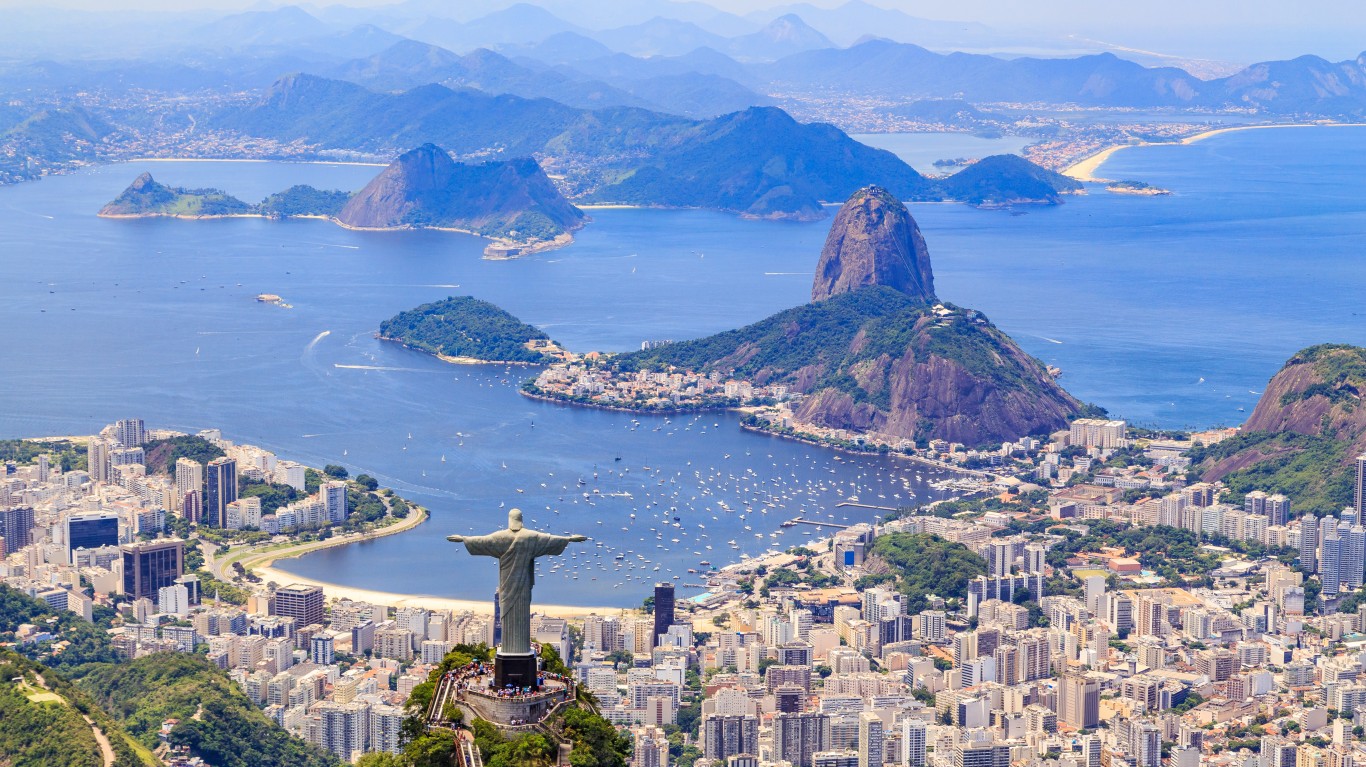
50. Brazil
> Population: 211.4 million
Brazil got its name from cargo that the Italian navigator Amerigo Vespucci brought back to Europe from South America in 1501. It was a cargo of hard, reddish wood that was similar to an East Indian wood called pau brasil, which Europeans were using to make cabinets.
After two decades of reviewing financial products I haven’t seen anything like this. Credit card companies are at war, handing out free rewards and benefits to win the best customers.
A good cash back card can be worth thousands of dollars a year in free money, not to mention other perks like travel, insurance, and access to fancy lounges.
Our top pick today pays up to 5% cash back, a $200 bonus on top, and $0 annual fee. Click here to apply before they stop offering rewards this generous.
Flywheel Publishing has partnered with CardRatings for our coverage of credit card products. Flywheel Publishing and CardRatings may receive a commission from card issuers.
Thank you for reading! Have some feedback for us?
Contact the 24/7 Wall St. editorial team.